#He is like every protagonist in a horse film ever
Text
Just watched 6x18 Frontierland and. Was horseback riding included in the John Winchester Training Regiment™ or is Sam just able to naturally ride a horse. One of the many college courses he took at Stanford.
#“Final girl sam” this “lore boy Sam” that. what about Horse Girl Sam#He is like every protagonist in a horse film ever#“but dad I can train him [rambunctious horse] and save our farm”#Supernatural AU but they're in a horse movie#supernatural#Sam Winchester
211 notes
·
View notes
Text
I wanted to share this! I was thinking back the other night about how the first book is heavily inspired from Shane and I had the thought of comparing Shane's actor (Alan Ladd) to the fist book cover illustration. Either I’m insane but I do feel like there’s a quite strong resemblance



It always stood out to me this illustration since even with Amano’s same face syndrome, I don’t think he’s ever drawn this particular face again? (Do put me in my place if I’m wrong though 🧎🙏) I wouldn’t be surprised if kikuchi told Amano the Shane influence and used that as the original basis for D’s features.
The book where I learnt it from, I got it at the same time I got into VHD! Translation after the photos for the interested ✨ (You can see for yourself how much Kikuchi was inspired from the movie)



Pic1
L
The film takes place in a large fertile Wyoming valley and follows the story of colonists, cowboys, and assassins/hired-gun. It portrays stand-offs between proprietors and farmers who defend their lands. Agricultural exploitation that led to the creation of towns with schools, churches, and commerce. The first born of the Ryker Brothers looks for every possible way to chase of the farmers, notably by destroying their crops with his troops, but Joe Starrett and his family fight to defend their rights as colonists. Yet the true protagonists of this story are Shane, an enigmatic and romantic ex-outlaw, and the son of Joe.
Shane passes the Starrett’s farm by chance. His past is clear even if he never mentions it, it’s as if he was destined for violence. The young Joey is fascinated by this man, who in the eyes of a child, is a heroic figure who knows how to use pistols and defend against anyone. But Shane leaves behind his guns in his room and helps work on the farm, he finds himself seduced by its serene atmosphere and attracted to Marian Starrett, Joe’s wife. Inescapable destiny leads Joey to pick up his pistol again when an explosion of conflict occurs between the farmers, the colonists, and the arrival of Wilson. An assassin hired by the Ryker’s to put an end to the farmer’s resistance. Shane kills the bandit, liberates the colonists from the Ryker’s grasp, all of which under the eyes of Joey who doesn’t succeed in convincing Shane to stay at the farm.
R
The final goodbye between the young Joey Starrett and the mysterious Shane is particularly poignant. The child sees the man as a hero and invites him to stay but Shane, celibate to the philosophy of the West, heads off as all men must follow their own path. While the cries of the child ring out in the valley, Shane slowly fades away alone on his horse
Pic2
Too lazy to translate, it’s about the film’s reception and actors.
Pic3
The film in 24 photos
Ex-Outlaw Shane arrives at the farm of a family of tranquil colonists, the Starretts.
Marian Starrett and her young son Joey are immediately fascinated by this man
The ex-farmer Ryker and his men want to take the land from the colonists to raise their cattle
Joe Starrett invites Shane to his table and offers him to work on his farm
Shane accepts the job and a new life begins for him
Shane enters town to go make purchases
Shane arrives at the general store of the town
Shane is insulted and provocated by one of the Ryker’s men, but he doesn’t respond to the provocation
The families of colonists come together to decide how to fight back against Ryker and his men
Shane returns to the general store with Joe Starrett, and under the eyes of the young Joey, reacts to the provocation that was made to him
An outlaw, Wilson, hired by Ryker to kill Shane arrives to town
Shane returns to the farm after the quarrel in the general store
Marian Starrett is secretly in love with Shane
A moment of peace: the colonists families unite for a party
The assassin is at the saloon with other shady individuals
Wilson kills a young colonist
They grieve the young assassinated colonist
Ryker and his men burn down the home of another colonist
The put in motion a new plan to intimate the Starretts into abandoning their farm
Shane decided to put an end to the situation
He confronts Wilson in the saloon
Shane beats the assassins and kills Ryker
Shane says his goodbyes to the young Joey
In the end peace has returned and Shane leaves the Starretts to never return
#vampire hunter d#vhd#shane#thoughts#Brithday today! No art but I wanted to do something 🥲💖 And I thought it was cool enough to share! since I see no one mentioning it#Also the whole ex-outlaw all the possible head cannons for D’s past too 👀👀#Forgive me if the translation is shit i don’t do it that often and I can’t write 💀#I want to watch the movie#and see what I can apply from Shane to D 🧎Maybe I’ll even share if it’s worth it
17 notes
·
View notes
Text
The Devil [Diabeł] (1972)

If The Third Part of the Night considered the total collapse of a world gone mad through a psychological lens, The Devil considers a similar conceit in a sexual and physical capacity. In a region all to familiar with repeated invasion and all of the atrocities that comes with it, Żuławski this time delves back to 18th Century Poland at the time of its second partition. This distance allows for an almost folkloric element to be included in the form of the Stranger. A darkly jester-like figure, he’s either a slimy low-level government worker looking to position himself favorably under the new regime or Satan himself (they’re the same thing, amirite???). His every appearance means no good will come for our wayward protagonist Jakub, prodding the bedraggled and increasingly insane man to corrupt his soul more and more. Jakub is discovered initially in a prison cell awaiting judgment for his role in the attempt on the king’s life, and what a world is this prison. Open bonfires surround the entrance, women wail and prisoners moan, Prussians kill at will. It’s a world of complete insanity, from which there can be no respite. The Stranger ushers him and wayward nun Zakonnica out of the prison and bids them return to Jakub's home. But there’s no going home for Jakub's soul.
If the Stranger is indeed the titular demon, he exists simply to prove that the same evil is possible within the heart of man as in the Adversary. Jakub is dragged along by this cheeky black-clad fellow who seems almost gleeful at the prospect of everything he’s suggesting the man do, obliquely or not. He expresses regret, and yet Jakub still kills time and again. There is also a troubling through-line of incest in his family: his sister marries her half-brother, was perhaps assaulted by her father, and Jakub waits FAR too long to reveal his identity to his mother when they meet in her brothel. There are Habsburg tier issues here, and sanity does not linger long for any. Yet for all of this bleakness, Żuławski does grant a sort of victory for good. Zakonnica, perhaps the greatest victim figure in the whole film, always catatonic with terror and small, castrates the Stranger and casts him down. She is joined in the end by the other abused figure, the illegitimate son of Jakub’s mother who was captive in the brothel. Amid all of the horror of humanity and war, some goodness or hope can exist, if in a frail form.
While theatricality is nothing unique to Żuławski’s filmography, this is on a whole other level. His camera is dynamic as ever. Of particular interest is an early shot: the camera follows the relentless advance of a flag and a cross which border the frame, surrounding a bacchanal of hedonists dancing. They are all summarily married to the state, these symbols of authority dominating them in a way which proves inescapable. But it’s more pervasive than that. People don’t move like humans. Jakub flails about in madness with every realization at what he has done. His ex-fiancée seizes in fear at Jakub’s revelation. Zakonnica quivers in catatonic fear and then melts at the slightest turn of a gaze. The Stranger bounds about like a court jester. Men stagger along for moments after they’re shot in the forehead, taking their time before collapsing. This, combined with the theatrics of images like Jakub taking a burning flag and using to ignite his family home, might come across as melodramatic or overwrought in lesser hands. Here, it seems to convey just how far gone everything is. The madness simply cannot be contained.
THE RULES
SIP
The Stranger kills someone.
People have incredibly dramatic reactions to something
BIG DRINK
Jakub gets on or off a horse.
Hard cut to black.
#drinking games#the devil#andrzej zulawski#polish cinema#horror#horror & thriller#historical drama#drama
3 notes
·
View notes
Note
Daily Denim Questions #13: I don't remember anyone ever asking you this... Favorite movie/movie series? Favorite movie universe? Characters?
Er...
Favourite movie?
Growing up I was a horse kid. I was the kid in every class that was absolutely obsessed with horses. I drew them all the time. Spent all my time around them every bloody chance I got. If dad and I were driving somewhere I'd shout out "Horses!" when we passed Undoolya Station.
My favourite movie was (and probably still is) Spirit: Stallion of the Cimarron. Amazing film. One of Dreamwork's best. The music is to die for and Hans Zimmer did amazing with it. And I love that for once, the villain isn't even defeated. There's no "great evil" that's smote from the face of the earth. The Colonel lets Spirit and Little Creek go out of respect for the both of them. I like that, like the respect between protagonists and antagonist.
Favourite movie universe?
Pirates of the Caribbean! Jack Sparrow, my beloved. All of the movies are incredibly quotable but my favourite is the third. Could watch that on repeat and never get tired of it. I notice something new with every rewatch.
Favourite movie character?
Probably Jack Sparrow! He's hilarious and (because of the Autism™) I studied him like a bug as a teenager. Half of my charm is absorbed from Jack Sparrow swagger. So, er... Yeah. Cheers, writers of POTC. You've made me blend in a little better.
5 notes
·
View notes
Text
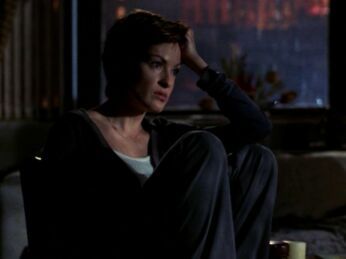
Evocations: XIV (c)
Olivia wasn't about to let the hospital call Alex's parents before she did, so she lied, told the doctor that she would have to retrieve their contact information. Still numb, she found an indoor courtyard that was walled almost completely with glass. It was cool inside, and she could hear the faint trickle of a fountain.
With shaking fingers, she dialled Darcie's number. The older woman, who still had a protective detail of her own, picked up after a single ring.
"Olivia? What is it?"
The sting of pain in her throat, and her eyes was enough to make the stone-tiled floor swim beneath her. She swallowed, then choked only, "Darcie . . ."
But Alexander's mother already knew. The sound of Olivia's voice, the hour of the phone call. "Alexander!" she shrieked in desperation for her husband.
Olivia told them weakly to be on the next flight to the city. After that, Darcie began to scream.
The faintest streaks of dawn light were bleeding into the sky by the time Elliot convinced Liv to let him drive her home. He swept her place, spoke with the detail set up in the hall, then offered to stay with her a while longer if she wanted. She sent him away, wanting only silence.
After locking the door behind him, Liv turned to the apartment, which suddenly seemed ridiculously large for one person, and empty of everything that had made it comforting. In her hands was the jacket that Alex had been holding over her shoulder when . . . when it happened.
Her eyes welled with fresh tears as she stroked the material between her fingers, trying to find some reality in what was happening. Walking slowly, as if her feet pushing air was enough to hold her down, Liv coasted to the kitchen, managed to pour herself a glass of wine, and slid onto a stool at the island, unclipping her holster to lay her gun alongside the wine bottle.
As she sipped her wine, the jacket lay across her thighs, and Olivia smoothed her hands over and over it. After a few more sips, she picked the coat up and brought it to her face, burying her face. A body-shaking sob rose from her chest and poured out of her as Liv breathed deep of Alexandra's soothing scent.
The sobs continued their painful, air-stealing march from her, as she let grief rip her heart in two, until she was gasping to get her lungs to refill, her cries coming out soundlessly. Olivia hugged the jacket against her body, begging to be allowed to crawl into the grave with Alexandra.
This was when she felt something in one of the pockets. It startled her enough to cause her sobbing to relent suddenly, stuttering to a pause as she sniffed hard, looking down dumbly as if she couldn't remember how pockets worked. Long minutes crawled by, until finally Liv worked her hand inside, closing around the item and pulling it out.
When she registered what it was, sitting there in her palm, small and square and much too real - unlike the rest of the night - her heart began to pound.
No, she thought. No, please. Though she didn't know who she was pleading with.
Olivia's breathing was shallow as she opened the velvet box, to reveal the magnificent rose gold ring inside. A noise that defied description left her then, and she placed the open box on the kitchen island as though what had just been revealed was from the climax of a horror film - an eyeball perhaps, or an ear cut from a story's protagonist.
Before her on the counter from left to right, there sat the bottle of red wine, the open ring box, the half-glass of wine, and her gun snug in its holster. Liv sat, unblinking, her brown eyes fixed on the ring.
Suddenly her hand was on her gun, fingertips pressed hard into the cold, familiar steel. Could a heart pound and time slow simultaneously? Olivia's shock-addled mind was nowhere and everywhere at once. Was she trying to ground herself? Shoot herself? If asked, she couldn't have said for sure.
Then she was plucking the ring from the box, and she pushed it slowly onto her finger, admiring its understated elegance. She thought about the dinner Alex had planned, about the way the blonde had looked at her the other night while she had been trying out the new dress.
Her eyes filled up again, and she stood up abruptly, Alex's jacket pooling to the kitchen floor in a whisper. Liv tried to imagine Alexandra on one knee, tried to imagine her eyes when she said yes. The hollow that grief had carved out inside of her was like a crack in a house, letting in cold wind.
The hand wearing the ring pulled her gun from its holster, her palms cold sweating onto the steel, the other onto the marble counter. All of a sudden, the ticking of the kitchen clock was cacophonous.
Then Olivia blinked and her lungs filled again, as though someone had released a pull-string at her back. She released her clutch on her gun, then removed the ring from her finger, placing it back in the box and closing it up matter-of-factly. As fresh tears began to fall, she picked up the wine glass, still half full, and threw it with a grunting shriek across the room. It hit the backsplash to the left of the sink, shattering into shards of glinting glass and streaking red everywhere. Sky High jumped up from where she had been dozing at Olivia's feet and yelped.
Just like Alex's blood, she thought.
Picking up the bottle, she bent to retrieve Alexandra's jacket, then turned to move into the living room. In just a few hours, Darcie and Alexander would land in New York, and they would want answers.
.
.
The fact that became startlingly clear once the elder Cabots arrived, was that young lawyers are much less prepared for death than young cops.
Olivia's legal Will was on file, tucked neatly away in a filing cabinet in the unseen heart of One Police Plaza. Earlier just that year, she had officially updated the paperwork to name Alexandra as her sole beneficiary in the event of her death. No such paperwork existed for Alex. The statuesque blonde had been brilliant, stubborn, and utterly defiant when it came to matters of danger or finality. The irony was lost on none of them.
Alexander made a valiant effort to convince Olivia to keep the apartment the two had shared, but she couldn't bring herself to agree to it. Once they travelled back home, she told them, she would take Sky to her old place and they were free to sell the empty place if they chose.
It was no surprise that Darcie participated little in the long list of things that needed to be done in New York. She moved like a ghost from room to room in the apartment, looking but not truly seeing. Alexander and Liv shouldered the responsibility of going through Alex's work desk, closets, bills, and other assets or responsibilities.
Enraged by the fact that Liv hadn't been allowed to see Alex before her body was taken away, he arranged for the majority of her financials to be put into Liv's name. He also agreed on splitting any sale of the apartment in half. They worked out the details of the funeral service with as much input from Darcie that they could wring from the medicated, shell-shocked woman.
On the third day, Olivia returned to work. Being with Elliot felt safe, and kept her mind on work. The mood in the bullpen, however, was no better than the apartment. They all knew the funeral was coming, and their faces were all roadmaps of grief, guilt, and anger.
It was very late when Liv let herself in to the guarded apartment that night. She'd assumed that Darcie and Al would both be asleep in the guest room. So when she rounded into the living room to find the older man sitting up in the armchair, Olivia jumped visibly and caught her breath.
"Sorry," she exhaled, "I thought you'd be asleep."
The tall man had a glass of scotch that he was holding with both hands, and only one lamp was on, throwing a circle of light over his midsection, where Sky High was curled on his lap.
"I've been having as much trouble sleeping as you have," he said quietly.
Liv had been napping fitfully, on the living room sofa, at intervals of about an hour or so, clutching Alexandra's jacket.
"Get yourself a drink, Olivia," Al said. "Sit with me."
She returned from the kitchen with a glass of wine. She sat silently across from him on the sofa and they eyed each other stoically over the rims of their beverage glasses with the weight of their pain. Olivia loved the man; she wondered if he blamed her.
"When my little girl was still a little girl," he spoke up abruptly, evenly, "she loved to tell me that she was going to do everything when she grew up. Like it was a job she could apply for: The Person Who Does Everything, instead of teacher or doctor. 'Daddy,' she would say, 'I'm going to do everything, at least once, you know!'"
Liv sipped her wine as he smiled softly. "So, she started right away. Anything she could try, Alexandra was first in line, clamoring for the opportunity. She danced ballet, took art classes, tried photography, broke and then showed horses, buddied up with chefs to learn from . . . and in school, anything she studied she aced.
"Math, Biology, Music, Physics - it didn't matter. Alex applied the same work ethic to them all equally, just because she loved learning new things. When she came home from university with her first girlfriend, I think Darcie and I wrote it off as just part of her mission to have every experience." He laughed at that, watching the light as it caught the amber glow of his scotch.
"Finally, of course, she settled on studying law. I think that surprised me the most, to be honest - that she went with something folks would have seen as obvious. But I don't think I ever thought of her as 'becoming' a lawyer. I just kept on thinking of her as Doing Everything. Her life was just the long act of trying everything on for size."
Alexander Cabot looked up and caught Olivia's exhausted, sad gaze. "Falling in love with you changed her, Olivia. Suddenly, 'everything' was somebody and not an unpinned location. She wasn't any less stubborn, or brave, of course," he chuckled, "but . . . she was satiated. Loving you was a triumph. I'm glad that she found that. It comforts me."
Olivia prayed that Al couldn't see the tears in her eyes across the shifting shadows of the room. She wanted so much to tell him about the ring box that was now buried in her underwear drawer, wanted to say, Look, look at what your daughter saw me worthy of.
But the words were tangled in her throat like knotted string, making her afraid that what came out wouldn't make sense.
When her glass was empty, she laid it on the side table and rose to her feet. As she passed the arm chair, Al took the hand that wasn't carrying his daughter's jacket. He squeezed it gently.
"This wasn't your fault, Olivia," his voice rumbled.
The funeral was in less than 36 hours.
.
.
Every motion in the office the day before the funeral felt like plodding through quicksand. The only one who even sounded right was Cragen, father to them all, trying to maintain some normalcy to keep things from sinking altogether.
"Well, isn't that nice." Cragen grimaced.
"What?" Munch asked.
"Rafael Zapata Gaviria was found dead in a holding cell awaiting a hearing. No witnesses," he announced.
"There goes Velez's extradition," Fin tagged on.
"I long for the days when the government would send in the Delta Force assassination squad," Munch shook his head.
Cragen approached Olivia and Elliot. "DEA Agent Hammond wants to see you guys tonight. There's the address." He passed along a piece of paper.
"What for?" Elliot asked him.
"Something about closin' out the case."
It was truly the middle of nowhere, and full dark when Olivia and Elliot pulled into the sandy dune lined with tangles of greenery. Crickets chirped wildly as they crossed to Hammond through the soft terrain.
"Nice location. Convenient," Elliot quipped.
"Sorry. Only way to do this."
"Do what?" Liv asked, noting the unusual amount of cars and agents.
"Wouldn't take no for an answer. Real pain in the ass, this one," Hammond griped.
The two detectives watched as a van door slid open, and a dead woman stepped into the moonlight. For one terrifying moment, Olivia thought she was dreaming, and that the fabric of the universe would threaten to yawn open and swallow her before she could hear Alex speak.
"I am so sorry about all of this," was what the blonde said. She was clearly exhausted, and a silk scarf hid the evidence of her gunshot wound.
Elliot gaped openly as tears filled his partner's eyes. "Your funeral's tomorrow," was what she managed to reply.
"And you're both expected to attend," Hammond cut in. "For the time being, Ms. Cabot's better off dead. If Velez can get to Zapata, he can get to her."
"Witness protection," Elliot guessed.
"Until Velez is extradited or otherwise dealt with."
No moment the agents could have granted them would have been enough to say all of the things that were screaming inside of Olivia like a siren gone awry. I love you - your parents are here - I found the ring - don't go again - I would've said yes - I'll die without you - thank God you're alive.
"How long?" she asked, stepping closer to Alexandra instinctually, her voice clotted with tears. Alex's eyes were also haunted, with wants, with questions, with guilt. She shrugged her shoulders sadly, not having an answer.
She wouldn't kiss her. Not there, not then. It wasn't a lack of want, but from knowing that if they touched each other, neither of them would let the other go again.
Static crackled over a radio, and a Marshall said, "We're on the move. Sorry, folks."
Another agent said, "Move them out," and Liv and Elliot watched as Alexandra stepped out of their lives again - this time, much more quietly.
When the vehicles had all followed behind, leaving just the two detectives in the cold October night, Olivia let out the sob she had been choking back. When Elliot reached out a hand, she stumbled away from the gesture, hunching over the curb and dry heaving above the grass as wave after wave of nausea knotted her stomach.
Elliot rubbed her back carefully, as though soothing one of his daughters, and waited until she was ready to stand up. When she at last met his gaze, she was wondering how she could go home to Darcie and Alexander and pretend their only child was still dead. How would she go on doing anything, when her entire life had winked out like the sudden last gasp of a dying star?
El smiled sadly, threw an arm around her shoulder, and herded her towards their sedan. For now, nobody had answers, just a trail of destruction and change left behind in the New York Autumn.

#law and order svu#svu#olivia benson#alexandra cabot#alex cabot#olivia x alex#cabenson#evocations#hearteyes4mariska#my writing#fanfic#my fanfiction#angst#loss#elliot stabler#john munch#fin tutuola#donald cragen
26 notes
·
View notes
Text
THE AARONS 2020 - Best TV Show
It was prime time for TV in 2020, with many more free hours to fill. I managed to get through a lot of my backlog in fact, finally getting around to watching shows like The Strain. It’s a show about a deadly disease that tears society apart because a lot of arrogant people think they are exempt from quarantining. The disease turns people into vampires, so it’s technically escapism. Here are the Aarons for Best TV Show:

#10. The Plot Against America (Miniseries) - HBO

It’s not TV, it’s not HBO, it’s real life. The Wire-creator David Simon’s penchant for illustrating the human fallout of institutional failures made him a perfect collaborator for HBO’s Plot Against America, an adaptation of Phillip Roth’s alternate-history novel. Following a Jewish family in New Jersey navigating the increasingly-fascist America of a hypothetical Charles Lindbergh administration, the show is a terrifying warning of what happens when hatred and conspiracy theories are allowed to accumulate political force. Notably, while the book ends with history back on the right track, the closing moments here are left ambiguous. The show was a limited series, but in many ways, The Plot Against America is ongoing.

#9. Mrs. America (Miniseries) - FX

Its interests are married to The Plot Against America, but Mrs. America traces the country’s rising extremism from a more historically accurate perspective. The miniseries centers on political activists in the 1970s on opposing sides of the proposed Equal Rights Amendment, but its dialogue isn’t a strict dichotomy. The episodic format is expertly utilized to build out intersectional ideas from the likes of Rose Byrne’s Gloria Steinem, Uzo Aduba’s Shirley Crisholm, and Margo Martindale’s Bella Abzug, detailing the difficulties in building a diverse coalition, and the dangers of a single-minded one. Drawing parallels to current debates, its compelling centerpiece is how conservative Phylis Shafley (Cate Blanchett) successfully defeats the Amendment; voting against your own self-interests, Mrs. America says, is as American as apple pie.

#8. The Outsider (Miniseries) - HBO

Societal collapse comes from within in the two shows mentioned above, but the threat in HBO’s adaptation of Stephen King’s 2018 novel is decidedly an “other.” King clearly had his mind on modern manipulations of truth when crafting the ingenious premise: a man is arrested for the murder of two young boys due to irrefutable DNA evidence, only to provide an air-tight alibi for the crime. To match King’s procedural prose, HBO brought on The Night Of’s David Price, who layers the original work with meticulous mysteries. The Outsider has all the pulpy jolts expected of the author, but the show’s true horror lies in its overbearing grief, best brought to life by Ben Mendelsohn’s Detective Anderson. To say more would be to spoil its secrets; you’ll want to be on the inside.

#7. Perry Mason (Season 1) - HBO

Just like the famous fictional attorney, HBO can’t seem to lose, with Perry Mason marking its third entry on this list. The reimagining of the long running court drama actually takes place before the character’s illustrious law career; here he’s a down-on-his-luck private eye caught up in a scandalous child kidnapping case. The result’s a gangbusters production of old-fashioned moody noir: political corruption, femme fatales, and a more morally-complicated Mason, as played by The Americans’ Matthew Rhys. The lavish period details and character-actor cast, including Shea Whigham, John Lithgow, and Tatiana Maslany, will help draw viewers in, but, I’ll confess, I was already hooked by the season’s chilling opening moments.

#6. Zoey’s Extraordinary Playlist (Season 1) - NBC
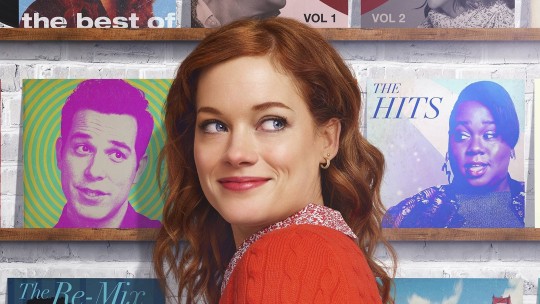
Dour seasons have dominated this list thus far, but Zoey’s Extraordinary Playlist sings a different tune. It’s a lovably oddball premise: an accident during an MRI causes a young woman, played by Jane Levy, to hear other people’s thoughts in the form of popular music. It’s all karaoke, but, emphasized by the presence of Skylar Astin, a worthy inheritor to Crazy Ex-Girlfriend’s musical-comedy crown. The tracklist, workplace antics, and love-triangle drama all exist in a comfortingly familiar network TV realm, but the show takes additional steps for inclusion with stories highlighting Zoey’s genderfluid neighbor (Alex Newell) and an American Sign Language performance of Rachel Platten’s “Fight Song.” During a year in need of shuffling off stress, there was no better time to queue up Zoey’s Extraordinary Playlist.

#5. What We Do in The Shadows (Season 2) - FX
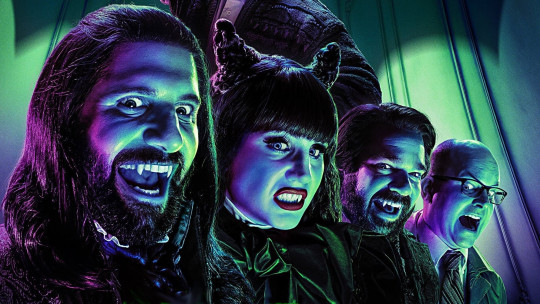
FX’s expansion of the mockumentary feature film of the same name lit up some of the darker corners of its universe in the show’s second season, transforming mundane-seeming material into something completely, uniquely batty. Each creature of Shadows took their turn in the spotlight this season, from a middle-management promotion gifting energy-vampire Colin Robinson unlimited supernatural power, to undead Nadja befriending a doll possessed by her own ghost, to Matt Berry’s Lazlo forging a small-town persona as a bartender/volleyball coach to escape a vengeful Mark Hamill. As always, it was the sympathetic Guillermo (Harvey Guillén), a Van Helsing descendent desperate to become a vampire, who gave the show its emotional stakes, and the vampires within a different kind altogether.

#4. Stargirl (Season 1) - DC Universe
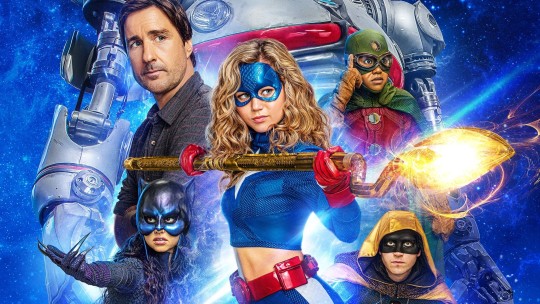
Shadows was lit, but few things burned brighter this year than Stargirl (perhaps too brightly for the flamed-out DC Universe). The superhero drama is one of several that will outlive its original streaming service - fitting, given its obsession with legacy. Based on a character created by DC Comics stalwart Geoff Johns after the tragic loss of his sister, the show finds a young girl taking on the mantle of a fallen hero after moving to a town run in secret by supervillains. With sprightly fight choreography and an unabashed embrace of its comic book lore, Stargirl outshines the overabundance of small-screen superheroes out there. Its highlight is the bright performance of lead Brec Bassinger; put simply, she’s a star, girl.

#3. BoJack Horseman (Season 6b) - Netflix

Throughout its run, BoJack Horseman garnered acclaim for routinely delivering unexpected pathos, and the final season kept it on that track until the end. ...Get it, because horses run on tracks? The unexpected porter of television’s legacy of antiheroes ended in much the same vein as its sister shows - with consequences finally catching up with its protagonist. No amount of fanciful animal puns could soften that painful catharsis, as the show finally trampled its tricky web of abuse through bittersweet means. The series closed out with an especially thoughtful scene, the kind viewers who looked past the wonky pilot years ago were regularly blessed with; to the very end, BoJack, you were a gift, horse.

#2. Better Call Saul (Season 5) - AMC

As good as Bad ever was and better than ever before, the fifth season of AMC’s spin-off completely upended the world of its eponymous lawyer while bringing Vince Gilligan’s universe one step away from full-circle. Saul Goodman found himself in way over his head, and viewers found themselves way on the edge of their seats, as his first foray into “criminal” lawyering swiftly dovetailed with an escalating drug war. Despite the emotional distress of watching fan-favorite character Kim Wexler placed in perilous situations, there are no objections to be had with the drama’s continued masterful storytelling. Ramping up the slow-burn storytelling, season five saw Kim and Saul’s relationship develop in rich and unexpected ways, while still keeping their final fates unresolved. Fans are thus waiting with bated breath for the show’s final call next year.

#1. The Great (Season 1) - Hulu
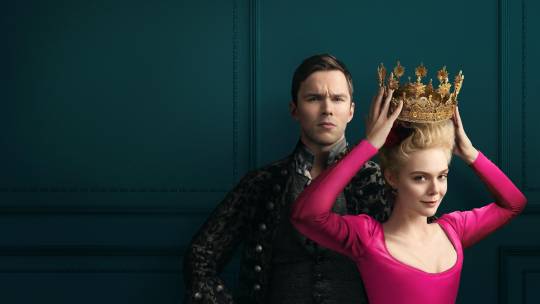
Who could be the best but The Great? There was a minor television controversy this year over Netflix marketing The Crown as a historical drama despite its fictional interpretation of events; The Great has no such pretentions. An asterix adorns every title card of the show, letting viewers know that its take on Catherine the Great’s coup against Emperor Peter III of Russia is only “an occasionally true story.” The show indeed is not great for education, but it’s the most entertaining television of the year, locking stars Elle Fanning and Nicholas Hoult in a battle of wits and a fight for the country’s soul under the watch of The Favourite co-writer Tony McNamara. The uproarious comedy slyly collates leadership based in cruelty with leadership based in goodwill in the background of its quite bawdy escapades, a subtle bit of relevant political maneuvering that lets it successfully claim the crown this year.

NEXT UP: THE 2020 AARONS FOR BEST TV EPISODE!
#tv#TheAarons#TheAarons2020#TheAaronsTV#best of 2020#the plot against america#mrs america#the outsider#perry mason#zoey's extraordinary playlist#what we do in the shadows#stargirl#bojack horseman#better call saul#the great
33 notes
·
View notes
Text
The Princess Bride: The Characters, Part 2: The Sicilian Crowd, the Villains, and Conclusion
When we are first introduced to Inigo, he’s not exactly a glowing example of heroism. A former alcoholic, Inigo is a Master Swordsman, working as a mercenary, he is one of the trio who first kidnaps Buttercup (under Humperdinck’s orders). He’s fine with the abduction itself, but shows a few of his true colors when he objects to murdering her, already proving himself a little more decent than Vizzini, the leader of the band.
A little later, during the duel with Westley, much is revealed about Inigo, more in fact than you ever learn about the backstories of either Westley or Buttercup: the story of his father’s murder and his own desire for revenge, so strong that it has encouraged him to dedicate his life to mastering the art of fencing. The duel, exciting enough from an action and comedy standpoint, also clues the audience in on a few other key details: Inigo isn’t really all that bad of a guy, just a man on a Roaring Rampage of Revenge, again demonstrating the same duality (just reversed) that Westley does.
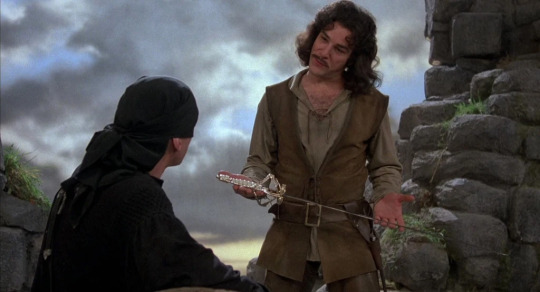
Despite not having as much screen time and focus as Buttercup and Westley, Inigo is the Breakout Character of The Princess Bride, a Determinator, the Lancer of the film. As I mentioned, he’s also the character we receive the most information about, learning that he is a man of honor, good hearted, and loyal through his interactions with other characters, notably Westley and Fezzik. Thanks to his sympathetic backstory and one-track mind, he’s understandable to the audience: we know everything about him and why he is doing everything. He’s totally transparent in the best way, he makes sense, and the audience roots for him. They care about him, even when he’s initially introduced as a more villainous character (albeit one with truly hilarious lines). The audience arguably has a stronger attachment to him than they do to Westley and Buttercup, which is very unusual, especially when Inigo disappears for a while after Westley defeats him in battle.
In a way, Inigo would seem to have the qualities very necessary to carry a film: tragic backstory, sympathetic motivation, understandable actions rooted in very clear character traits, and indeed, a lot of elements that put him in the Hero camp. And yet, like Buttercup and Westley, while some things fit him into this mold, others don’t.

Although he doesn’t have a connection to Humperdinck (aside from him being a distant employer), he does have a very strong tie to the main villains of the story in Count Rugen.
Rugen is, of course, the six-fingered man who murdered Inigo’s father so many years ago, and scarred Inigo himself. It is he that Inigo is out to get throughout the entire film (and his entire life), a much stronger tie to an individual character in a personal way than Westley’s nemesis: Humperdinck. Rugen is much more of an arch-nemesis, representing a very personal loss to Inigo, something that cuts much deeper, even, than true love. While Westley never seems particularly worried about himself or Buttercup because he just knows that True Love will keep them together, Inigo reacts very strongly to Rugen and his own emotional journey, traits more typically associated with a protagonist than a cool confidence in how everything will turn out.
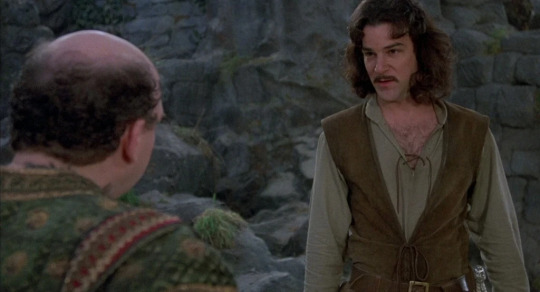
As a direct result to this personal stake in the story, Inigo, being at full strength and in full health, is the one who is given the final climactic battle at the end of the movie.
Where Westley has a rather anticlimactic confrontation with Humperdinck, Inigo gets a huge duel with Rugen, the climax centerpiece, the scene most memorable and most quoted in the entire film, ending in Inigo actually achieving his goal: getting revenge. Afterwards, he even muses that after having gotten his revenge, now he no longer knows what to do with his life, with the film implying that he will become the next Dread Pirate Roberts in Westley’s place.
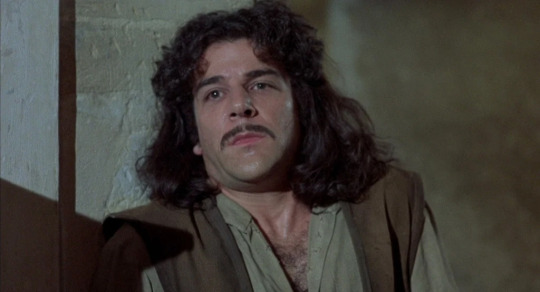
Unlike Westley, and even unlike Buttercup, Inigo has an arc, pursuing what he wants actively, achieving it, and moving on. He makes choices that have huge consequences in the plot: pursuing revenge, leaving Vizzini, finding Westley and bringing him to Miracle Max. In a way, a huge part of the story is Inigo’s, just as much as it is Buttercup and Westley’s.
Westley has the Heroic qualities, Buttercup has most of the focus (and her title in the movie’s name), and Inigo has the dramatic arc and climactic battle. On their own, no one character manages to pull off the full requirements for being a fantasy protagonist, or even a protagonist at all, but together, they manage to make one complete protagonist between them. While the story of The Princess Bride, in plot beats and story elements, seems very much like your very traditional fairy-tale story, in terms of protagonist, the execution is actually very complex. By taking the traits of a protagonist and dividing them equally between three characters with varying levels of screen-time and activism within a story (not always at the same time), the story manages to get the audience’s interest invested in not one, but three characters equally, weaving the major threads for each of their stories in amongst each other to keep it all tied together. And in the end, both the characters and the audience (even the Grandson!) feel closure and satisfaction.
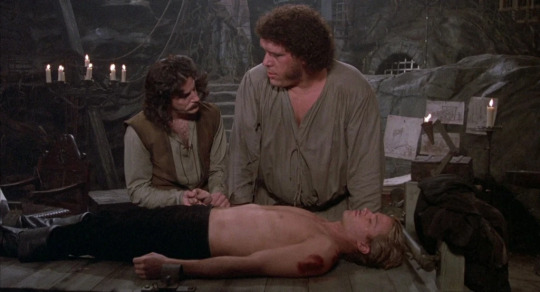
But Inigo, Westley and Buttercup aren’t the only characters in the film. Every story needs their supporting cast, and none are quite as supportive as Fezzik.
Fezzik is a Gentle Giant. He’s big and strong, for sure, but he’s also very kind, the Big Guy with a heart of gold who, while not exactly being a pushover, isn’t out to hurt anybody who doesn’t deserve it. He’s the Brute of Vizzini’s Beauty, Brains, and Brawn trio, and manages to subvert the Dumb Muscle stereotype. He’s not terribly clever, but he does have a wit and intelligence to him that isn’t typical of most fairy-tale giants.

He and Inigo are borderline inseparable, and much like Inigo, Fezzik is somewhat okay with kidnapping Buttercup for money, but he’s considerably less approving of killing her. Like Inigo, he is a man of honor, preferring to fight Westley in a ‘sportsmanlike’ way instead of clubbing him over the head with a rock like Vizzini first suggests. He’s a good, loyal friend, rescuing Inigo from the palace guards, sobering him up, and then accompanying him throughout the rest of the story in finding and reviving Westley and then storming the castle.
Unlike Inigo, Westley and Buttercup, Fezzik has no stake in this story. He has no goal to achieve here, no personal mission. After Vizzini, his ‘boss’, is killed, there’s nothing keeping Fezzik in the story except his own will, like the Chewbacca to Inigo’s Han Solo. He’s here because of his loyalty and concern for his friends. He just wants to help, and help he does, turning his back on his mercenary ways pretty easily and without any real convincing. He’s along for the ride, a supporting character that manages to be more than just ‘the comic relief’. (In a way, one of the smartest things The Princess Bride did in terms of its characters was to make everyone funny, so no one is relegated to ‘just’ the comic relief.)
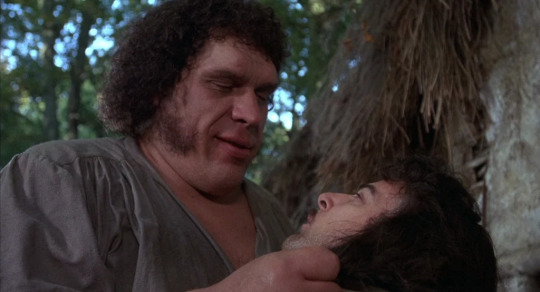
With that said, Fezzik still remains an active character in the story, helping with the storming of the castle and providing the Muscle (and the heart!) for the mission, and providing the escape by finding Humperdinck’s four white horses in his stable.
Starting out as a Minion with an F in Evil, Fezzik ends The Princess Bride as one of its most memorable and loved heroes, a kindly figure of support who’s anything but minor.

Which is more than we can say for the deceased leader of the trio of kidnappers: Vizzini.
Vizzini is the smartest of the trio sent to abduct Buttercup, but despite his bragging, he demonstrates hints that he’s not half as smart as he thinks he is. The brains to Inigo’s beauty and Fezzik’s brawn, Vizzini is merely a Big Bad Wannabe, the final obstacle for Westley’s initial reunion with Buttercup, a Disk One Final Boss before the plot kicks off with portraying Humperdinck as the real villain. However, while the film points out that Fezzik and Inigo fight Westley with honor, and he leaves them respectful of their talents (defeating them in the process), Westley shows no such respect for Vizzini’s ‘talents’, and simply Out-Gambits him, despite Vizzini’s Poisoned Chalice Switcheroo. In the end, Vizzini is Too Clever by Half, and is the only one of the Sicilian Crowd to be killed, most likely due to his arrogance.
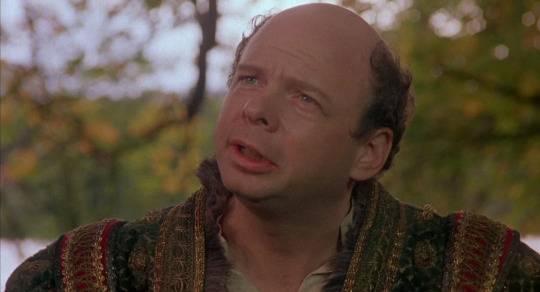
Despite his death being one of the most memorable scenes in the entire film, Vizzini doesn’t receive much screen time, or even narrative weight, in comparison to the true villains of the movie. After all, Vizzini is only a hired stooge, a pawn in Humperdinck’s evil plan.
Humperdinck, as far as fairy-tale villains go, isn’t terribly impressive. He’s no great dragon or emperor, or evil wizard. He’s just a prince, a man with a lot of power who’s used to getting his own way. He does plenty of rotten things along the way (torture Westley and kill him, order Buttercup’s kidnapping, attempt to kill her) but in the end, his goal isn’t world-domination, or wealth, or anything like that: he’s just after an excuse to go to war with the neighboring country. He’s not after Buttercup for her beauty, like many other fairy-tale villains before him, he’s just after her to use as a political figure, aiming to kill her after their wedding night and pin it on Guilder.
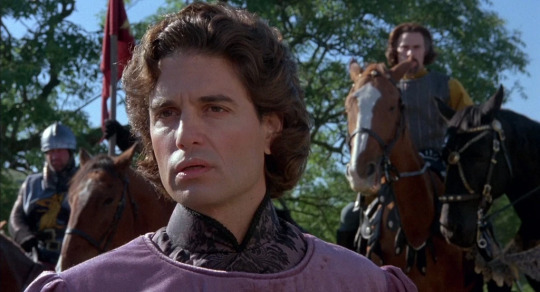
Arguably, this makes him worse.
There’s no great, over-the-top explanation for his villany. He’s not cartoonish or after traditional fairy-tale things, he’s actually after something that we’d see in the real world. He is the true Big Bad, the Chessmaster, The Evil Prince obsessed with war, who, ironically, happens to be a Dirty Coward.

Oddly enough, throughout the film, although Humperdinck is presented as the Archenemy of Westley, there’s no real personal connection between them. This isn’t like Beauty and the Beast, where both men are vying (in their own way) for Buttercup’s affection. Humperdinck honestly couldn’t care less about Buttercup, viewing her as a tool to get what he really wants. In the end, he rushes through a marriage ceremony in order to murder Buttercup after the wedding, again, nothing personal, just business. His only connection to Westley is happening to choose the wrong girl to murder.
As such, as opposed to Count Rugen’s thematically resonant demise, Humperdinck is actually allowed to live, and go free at the end of the story, which seems to be a big-time rule-breaker in terms of fairy-tale storytelling. The Grandson himself expresses irritation and disbelief at this fact, after all, villains should be punished, not sternly talked-down by a paralyzed hero.

Yet, that’s what happens. Considering that the most Humperdinck managed to do was temporarily kill Westley, he gets very little ‘revenge’ in return. Like I said in the Story article:
Westley couldn’t care less about Humperdinck other than the fact that he’s getting in the way of his and Buttercup’s storybook love. Humperdinck is an obstacle to his true goal and drive, and he’s not worth the killing. Once he’s out of the way and Westley and Buttercup are reunited, Humperdinck ceases to matter to Westley. If the story had been from Miracle Max’s point of view, Humperdinck would have died or at least, have something more horrible happen to him, but since Humperdinck never really succeeded in doing much of anything throughout the story, he’s actually so pathetic that he’s not worth Westley’s time.
So, yeah, Humperdinck is left to live with his cowardice because his death wouldn’t have provided the characters anything except maybe catharsis, and honestly, that’s not really a good enough reason to off your villain
He’s such a coward, he doesn’t even have a chance to take part in a climatic duel. He’s so unimpressive as a fantasy villain that he even strips the audience of their chance to see another sword fight, without diminishing his hatefulness and narrative weight as a villain.
Thankfully, the audience does get their climactic battle: thanks to Count Rugen.
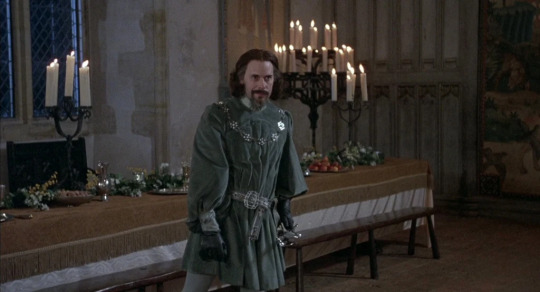
Rugen is Inigo’s archenemy, rather than Westley’s, and unlike the rivalry between the main protagonist and antagonist, Rugen’s relationship with Inigo is very personal indeed. Rugen, the six-fingered man that Inigo wants to hunt down and kill so badly, is the man who killed Inigo’s father, and left him scarred as a little boy. Rugen is the Dragon, a Soft-Spoken Sadist who serves as Humperdinck’s Right Hand Man and Torture Technician. He is the inventor of the torture machine that ends up taking Westley’s life, and throughout the film, serves as co-conspirator to Humperdinck.
He’s pretty rotten, and just like Humperdinck, proves himself to be a Dirty Coward too.
However, while Westley let Humperdinck live with that knowledge, Inigo offers Rugen no such mercy.
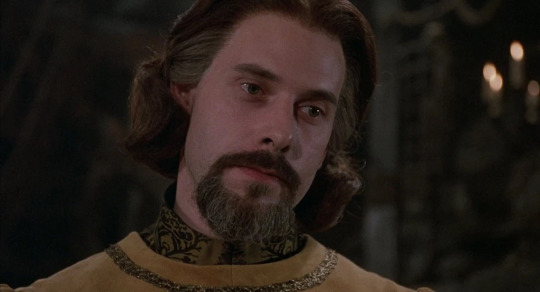
The final duel between Inigo and Rugen is one of the show-stopping setpieces of the film, paying off a considerable amount of buildup foreshadowed with much of Inigo’s dialogue and character. Like I said in the ‘Story’ article:
On the other hand, Inigo’s villain, Count Rugen, is killed, for a very simple reason: that’s the logical end to fulfill Inigo’s story.
In order for Inigo to feel fulfilled and gain satisfaction, to lay his father’s spirit to rest, Rugen has to die, knowing why he’s dying, and who it is who killed him. In a sense, the antagonists fit the ‘antagonist’ bill much the same way the protagonists do: by splitting the roles, from Humperdinck having the main plot being responsible for most of the obstacles, where Rugen fills in for the emotional punch instead.
There are other characters too, of course: Miracle Max and his wife Valerie, offering a comedic look at a few other residents of Florin, The Albino, Rugen’s assistant, The Impressive Clergyman, and even Yellin, the captain of the guard, but for the most part, these characters (aside from Miracle Max and Valerie being responsible for resurrecting Westley) serve as comedic filler, without much actual narrative weight.

As fairy-tale archetypes with surprising amounts of dimension, the characters of The Princess Bride all do their jobs with ease, falling into natural roles in an organic fashion, despite the unconventional structuring of the characters’ parts to play.
The beauty of all of these characters is that none of them are in the slightest bit realistic. These are very clearly ‘fairy-tale’ characters, who don’t think about things in the way that we do, and yet, the audience still relates to them, is entertained by them, is concerned for them. Even though characters don’t act in terribly realistic ways, they are motivated by things that we understand: love, revenge, etc. The audience feels and understands their emotions, and therefore understands where characters are coming from, even if the actions taken by the characters are primarily ‘fantasy based’, superhuman, incredibly skilled and heroic or villainous in the context of the story that the Grandfather is reading to the Grandson.
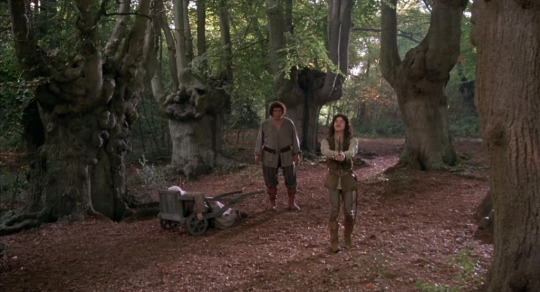
The Princess Bride’s characters are not portrayed as ‘people’, instead being played as simple characters typical of traditional ‘fairy-tale’ stories. Each character, whether hero or villain, behaves almost as though they know what part they inhabit, playing the ‘fairy-tale’ aspect straight, with a comedic edge to the archetypes found in a book, a familiar-feeling, simple, but emotional story that people have loved and laughed with for decades.
The characters of The Princess Bride serve their purpose incredibly well: making the audience care about what happens to them. Every role is memorable, unique, distinct, with plenty of quotes and character tics to be referenced and replicated decades later. They perfectly match the film they belong to: a fantasy classic that has finally been Vindicated by History, gaining it’s rightful place among fantasy greats.
Thank you guys so much for reading! If you have something you’d like to add or say, don’t forget that the ask box is always open! I hope to see you all in the next article.
#The Princess Bride#The Princess Bride 1987#1987#80s#Adventure#Comedy#Family#Fantasy#Romance#PG#Cary Elwes#Robin Wright#Mandy Patinkin#Chris Sarandon#Christopher Guest#Wallace Shawn#André the Giant#Peter Falk#Fred Savage#Rob Reiner#Film#Movies
34 notes
·
View notes
Text
52 Films by Women: 2020 Edition
Another annual challenge complete!
Last year, I focused on diversifying my list. This year I kept that intention but focused on watching more non-American films and films from the 20th century. Specifically, I sought out Agnès Varda’s entire filmography, after her death in 2019. (I was not disappointed - What a filmmaking legend we lost.)
I also kept a film log for the first time and have included some of my thoughts on several films from that log. I made a point of including reviews both positive and negative, because I think it’s important to acknowledge the variability and breadth of the canon, so as not to put every film directed by a woman on a pedestal. (Although movies directed by women must clear a much higher bar to be greenlit, meaning generally higher quality...But that’s an essay for another day :)
* = directed by a woman of color
bold = fave

1. The Rhythm Section (2020) dir. Reed Morano - Not as good as it could have been, given Morano’s proven skill behind the camera, but also not nearly as bad as the critics made it out to be. And unbelievably refreshing to see a female revenge story not driven by sexual assault or the loss of a husband/child.
2. Cléo de 5 à 7 (1962) dir. Agnès Varda - If you ever wanted to take a real-time tour of Paris circa 1960, this is the film for you.
3. Little Women (2019) dir. Greta Gerwig - Still my favorite Little Women adaptation. I will re-watch it every year and cry.
4. Varda by Agnès (2019) dir. Agnès Varda & Didier Rouget
5. Booksmart (2019) dir. Olivia Wilde - An instant classic high school comedy romp that subverts all the gross tropes of its 1980s predecessors.
6. Girls of the Sun (2018) dir. Eva Husson
7. Blue My Mind (2017) dir. Lisa Brühlmann
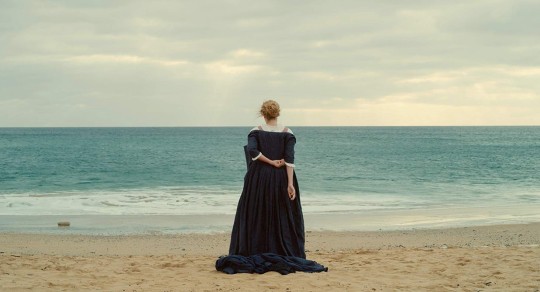
8. Portrait of a Lady On Fire (2019) dir. Céline Sciamma - Believe the hype. This film is a master thesis on the female gaze, and also just really effing gorgeous.
9. Belle Epine (2010) dir. Rebecca Zlotowski
10. Vamps (2012) dir. Amy Heckerling - With Krysten Ritter and Alicia Silverstone as modern-day vampires, I was so ready for this movie. But it feels like a bad stage play or a sit-com that’s missing a laugh-track. Bummer.
11. *Birds of Prey (2020) dir. Cathy Yan - Where has this movie been all our lives?? Skip the next onslaught of Snyder-verse grim-darkery and give me two more of these STAT!
12. She’s Missing (2019) dir. Alexandra McGuinness
13. The Mustang (2019) dir. Laure de Clermont-Tonnere - Trigger warning for the “protagonist” repeatedly punching a horse in the chest. I noped right out of there.
14. Monster (2003) dir. Patty Jenkins – I first watched this movie when I was probably too young and haven’t revisited it since. The rape scene traumatized me as a kid, but as an adult I appreciate how that trauma is not the center of the movie, or even of Aileen’s life. Everyone still talks about how Charlize “went ugly” for this role, but the biggest transformation here isn’t aesthetic, it’s physical – the way Theron replicates Wuernos’ mannerisms, way of speaking, and physicality. That’s why she won the Oscar. I also love that Jenkins calls the film “Monster” (which everyone labels Aileen), but then actually uses it to tell the story of how she fell in love with a woman when she was at her lowest, and that saved her. That’s kind of beautiful, and I’m glad I re-watched it so that I could see the story in that light, instead of the general memory I had of it being a good, feel-bad movie. It’s so much more than that.
15. Water Lilies (2007) dir. Céline Sciamma – Sciamma’s screenwriting and directorial debut, the first in her trilogy on youth, is as painfully beautiful as its sequels (Tomboy and Girlhood). It’s also one of the rare films that explores the overlap of queerness and girl friendships.

16. The Trouble with Angels (1966) dir. Ida Lupino – Movies about shenanigan-based female friendships are such rare delights. Rosalind Russel is divine as Mother Superior, and Hayley Mills as “scathingly brilliant” as the pranks she plays on her. Ida Lupino’s skill as an editor only enhances her directing, providing some truly iconic visual gags to complement dialogue snappy enough for Gilmore Girls.
17. Vagabond (1985) dir. Agnès Varda – Shot with a haunting realism, this film has no qualms about its heroine’s inevitable, unceremonious death, which it opens with, matter-of-factly, before retracing her final (literal) steps to the road-side ditch she ends up in. (I’m partly convinced said heroine was the inspiration for Sarah Manning in Orphan Black.)
18. One Sings, The Other Doesn’t (1977) dir. Agnès Varda – Probably my favorite classic Varda, this film feels incredibly personal. It’s essentially a love story about two best friends with very different lives. For an indie made in the ‘70s, the diversity, scope, and themes of the film are impressive. Even if the second half a drags a bit, the first half is absolute perfection, engaging the viewer immediately, and clipping along, sprinkling in some great original songs that were way progressive for their time (about abortion, female bodily autonomy, etc) and could still be considered “bangers” today.
19. Emma (2020) dir. Autumn de Wilde
20. Black Panthers (1969) dir. Agnès Varda

21. Into the Forest (2016) dir. Patricia Rozema - When the world was ending (i.e. the pandemic hit) this was the first movie I turned to - a quiet, meditative story of two sisters (Elliot Page and Evan Rachel Wood) surviving off the land after a sudden global blackout. Four years later, it’s still one of my favorite book-to-screen adaptations. I fondly remember speaking with director Patricia Rozema at the 2016 Chicago Critics Film Festival after a screening, her love for the source material and desire to “get it right” so apparent. I assured her then, and reaffirm now, that she really did.
22. City of Trees (2019) dir. Alexandra Swarens
23. Never Rarely Sometimes Always (2020) dir. Eliza Hittmann - To call this a harrowing and deeply personal journey of a sixteen-year-old who must cross state lines to get an abortion would be accurate, but incomplete. It is a story so much bigger than that, about the myriad ways women’s bodies and boundaries are constantly violated.
24. Paradise Hills (2019) dir. Alice Waddington
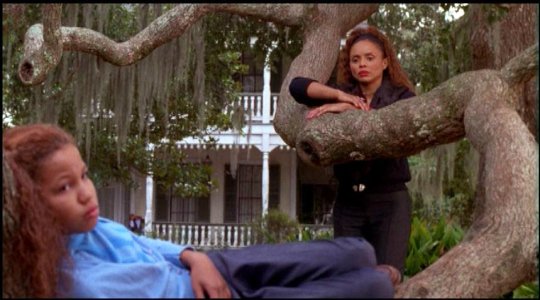
25. *Eve’s Bayou (1996) dir. Kasi Lemmons – I’ve been meaning to watch Kasi Lemmons’ directorial debut for many years now, and I’m so glad I finally have, because it fully deserves its icon status, beyond being one of the first major films directed by a black woman. Baby Jurnee Smollett's talent was immediately recognizable, and she has reminded us of it in Birds of Prey and Lovecraft Country this year. If merit was genuinely a factor for Oscar contenders, she would have taken home gold at eleven years old. Beasts of the Southern Wild has been one of my all-time favorites, but now I realize that most of my appreciation for that movie actually goes to Lemmons for blazing the trail with her story of a young black girl from the bayou first. It’s also a surprisingly dark story about memory and abuse and familial relationships that cross lines - really gutsy and surprising themes, especially for the ‘90s.
26. Blow the Man Down (2019) dir. Bridget Savage Cole & Danielle Krudy - Come and get your sea shanty fix!
27. Touchy Feely (2013) dir. Lynn Shelton - R.I.P. :(
28. Hannah Gadsby: Douglas (2020) dir. Madeleine Parry - If you thought Gadsby couldn’t follow up 2018′s sensational Nanette with a comedy special just as sharp and hilarious, you would have been sorely mistaken.
29. Girlhood (2013) dir. Céline Sciamma
30. Breathe (2014) dir. Mélanie Laurent
31. *A Dry White Season (1989) dir. Euzhan Palcy
32. Laggies (2014) dir. Lynn Shelton
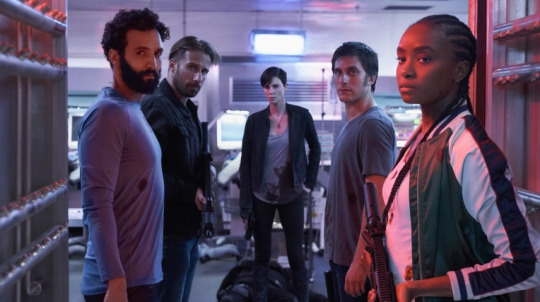
33. *The Old Guard (2020) dir. Gina Prince-Bythewood – Everything I’ve ever wanted in an action movie: Immortal gays, Charlize Theron wielding a labrys (battle axe), kinetic fight choreography I haven’t seen since the last Bond movie…Watched it twice, then devoured the comics it was adapted from, and I gotta say: in the hands of black women, it eclipses the source material. Cannot wait for the just-announced sequel.
34. Morvern Callar (2002) dir. Lynn Ramsay
35. Shirley (2020) dir. Josephine Decker
36. *Radioactive (2019) dir. Marjane Satrapi – The story is obviously well worth telling and the narrative structure – weaving in the future consequences of Curie’s discoveries – is clever, but a bit awkwardly executed and overly manipulative. There are glimpses of real brilliance throughout, but it feels as if the director’s vision was not fully realized, to my great disappointment. Nonetheless, I appreciated seeing Marie Curie's story being told by a female director and embodied by the always wonderful Rosamund Pike.
37. *The Half of It (2020) dir. Alice Wu - I feel like a real scrooge for saying this, but this movie did nothing for me. Nothing about it felt fresh, authentic or relatable. A real disappointment from the filmmaker behind the wlw classic Saving Face.

38. Mouthpiece (2018) dir. Patricia Rozema - I am absolutely floored. One of those films that makes you fall in love with the art form all over again. Patricia Rozema continues to prove herself one of the most creatively ambitious and insightful directors of our time, with this melancholic meditation on maternal grief and a woman’s duality.
39. Summerland (2020) dir. Jessica Swale - The rare period wlw love story that is not a) all-white or b) tragedy porn. Just lovely.
40. *The Last Thing He Wanted (2020) dir. Dee Rees – As rumored, a mess. Even by the end, I still couldn’t tell you who any of the characters are. Dee, we know you’re so much better than this! (see: Mudbound, Pariah)
41. *Cuties (2020) dir. Maïmouna Doucouré – I watched this film to 1) support a black woman director who has been getting death threats for her work and 2) see what all the fuss is about. While I do think there were possibly some directorial choices that could have saved quite a bit of the pearl-clutching, overall, I didn’t find it overly-exploitative or gross, as many (who obviously haven’t actually watched the film) have labeled it. It certainly does give me pause, though, and makes me wonder whether children can ever be put in front of a camera without it exploiting or causing harm to them in some way. It also makes one consider the blurry line between being a critique versus being an example. File this one under complicated, for sure.
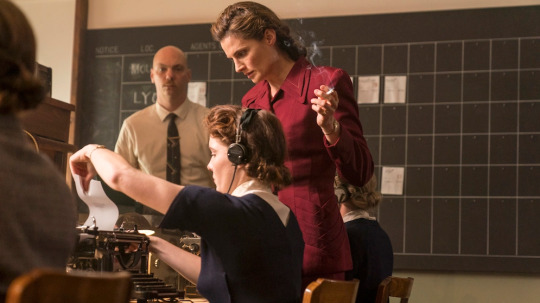
42. A Call to Spy (2019) Lydia Dean Pilcher – An incredible true story of female spies during WWII that perfectly satisfied my itch for British period drama/spy thriller and taught me so much herstory I didn’t know.
43. Kajillionaire (2020) dir. Miranda July - I was lucky enough to attend the (virtual) premiere of this film, followed by an insightful cast/director Q&A, which only made me appreciate it more. July's offbeat dark comedy about a family of con artists is queerer and more heartfelt than it has any right to be, and a needed reprieve in a year of almost entirely white wlw stories. The family's shenanigans are the hook, but it's the budding relationship between Old Dolio (an almost unrecognizable Evan Rachel Wood) and aspiring grifter Melanie (the luminous Gina Rodriguez) that is the heart of the story.
44. Misbehaviour (2020) dir. Philippa Lowthorpe – Again, teaching me herstory I didn’t know, about how the Women’s Liberation Movement stormed the 1970 Miss World Pageant. Keira Knightley and Gugu Mbatha-Raw’s characters have a conversation in a bathroom at the end of the film that perfectly eviscerates well-meaning yet ignorant white feminism, without ever pitting women against each other - a feat I didn’t think was possible. I also didn’t think it was possible to critique the male gaze without showing it (*ahem Cuties, Bombshell, etc*), but this again, invents a way to do it. Bless women directors.
45. *All In: The Fight for Democracy (2020) dir. Liz Garbus and Lisa Cortes – 2020’s 13th. Thank god for Stacey Abrams, that is all.
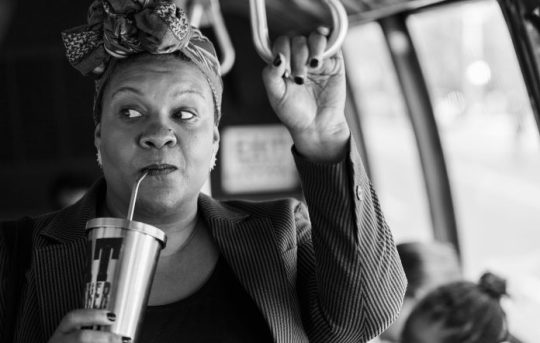
46. *The 40-Year-Old Version (2020) dir. Radha Blank – This scene right here? I felt that in my soul. This whole film is so good and funny and heartfelt and relatable to any artist trying to walk that tightrope of “making it” while not selling their soul to make it. My only initial semi-note was that it’s a little long, but after hearing Radha Blank talk about how she fought for the two-hour run-time as a way of reclaiming space for older black women, I take it back. She’s right: Let black women take up space. Let her movie be as long as she wants it to be. GOOD FOR HER.
47. Happiest Season (2020) dir. Clea Duvall - Hoooo boy. What was marketed as the first lesbian Christmas rom-com is actually a horror movie for anyone who’s ever had to come out. Throw in casual racism and a toxic relationship treated as otp, and it’s YIKES on so many levels. Aubrey Plaza, Dan Levy, and an autistic-coded Jane are the only (underused) highlights.
48. *Monkey Beach (2020) dir. Loretta Todd
49. *Little Chief (2020) dir. Erica Tremblay – A short film part of the 2020 Red Nation Film Festival, it’s a perfect eleven minutes that I wish had gone on longer, if only to bask in Lily Gladstone in a leading role.
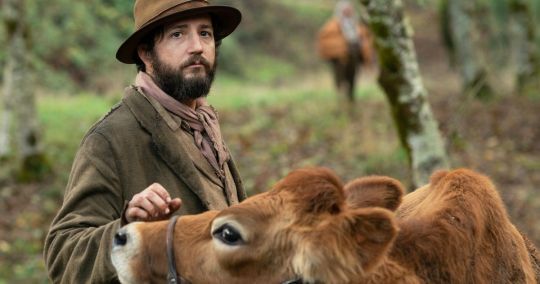
50. First Cow (2019) dir. Kelly Reichardt – I know Kelly Reichardt’s style, so I’ll admit-- even as I was preparing for an excellent film, I was also reaching for my phone, planning on only half paying attention during all the inevitable 30-second shots of grass blowing in the wind. (And yes, there are plenty of those.) But twenty minutes in, my phone was set aside and forgotten, as I am getting sucked into this beautiful story about two frontiersman trying to live their best domestic life.There is only one word to describe this film and that is: PURE. I’ve never seen such a tender platonic relationship between men on screen before, and it’s not lost on me that it took a woman to show us that tenderness. Reichardt gives us two men brought together by fate, and kept together by a shared dream and the simple pleasure of not being alone in such a hard world; two men who spend their days cooking, trapping, baking, and dreaming of a better life; two men who don’t say much, but feel everything for each other. The world would be a much better place if men showed us this kind of vulnerability and friendship toward each other. Oh, and it’s also a brutal take-down of capitalism and the myth of the American Dream!
51. Wonder Woman 1984 (2020) dir. Patty Jenkins - My most-anticipated film for the past two years was...well, a mixed bag, to say the least. Too many thoughts on it for a blog post, so stay tuned for the upcoming podcast ep where we go all in ;)
52. *Selah and the Spades (2019) dir. Tayarisha Poe
I hope this gives you some ideas to kick off your new year with a resolution to support more female directors!
What were your favorite women-directed movies of last year? Let me know in the tags, comments, or asks!
26 notes
·
View notes
Text
Wonder Woman 1984

The first 3/4 of 2017’s Wonder Woman was my favorite film of that year. The last 1/4 was my least favorite film of that year. What can I say, I have a complicated relationship with the DCEU, and the part I keep getting disappointed by is the big smash-em-up, explosions everywhere, muddy mess of orange/blue filter in the “climactic showdown” between hero and villain. I just don’t have the patience for it anymore, and I was so hoping that the Jazzercise vibes of Wonder Woman 1984 would do something different.
As it turns out, this movie was trying to warn me like so many stories that have come before - be careful what you wish for. Just how badly did my wish go bad? Well...
I’d already heard some questionable things about the movie before I tuned in, so my expectations were tempered but I guess it was on me. I should have known better than to wish for a story with reasonable pacing, some kind of consistent tone, villains with discernable motivation, or a Wonder Woman movie that was actually about fucking Wonder Woman. I’m not even mad as much as I am puzzled. That and tormented by Pedro Pascal’s manic televangelist energy in my dreams.
Some thoughts:
I have never wanted to go anywhere as much as I want to in 2020, and the place I want to go more than any other is Themyscira. Love this first sequence. Why is the whole movie not about Themyscira??
If the Olympics were like this whole long Amazonian warrior triathlon, I would be WAY more into track and field.
Also I legit don’t understand the problem with her taking the short path? Like, it’s there for a reason? She just caught up to her horse? Someone explain this to me.
So this mall...basically the hub of American commerce in the 80s that was practically printing money, it made it so fast...is secretly a front for antiquities trading on the black market? And these unorganized-ass dipshit criminals who seemingly just walked in off the street and decided to engage in some light robbery today are after antiquities? Sure, Jan.
Ohh I miss Waldenbooks so much!
This thwarting of crime sequence in the mall feels so...cheesy. Schlocky, almost. Like a 50s comic book come to life. I dunno, it just doesn’t feel like the tone I was expecting. In the context of the whole film, we really blew our action load in these first 2 sequences, and also this is the last point in the movie in which Diana actually resembles her character from the first film.
I would also be stammery and blushy when talking to Diana Prince for the first (and second) time, but I’m kinda getting a gay vibe from Barbara. This meet-cute + date is definitely playing up romantic vibes. Kristen Wiig is so good at characters like these - in less than 2 scenes, I have such a clear picture of who Barbara is, what she wants, what she fears, and that’s all down to Wiig’s choices. [ETA: This makes it all the more infuriating when Barbara suddenly is like “I want to be an apex predator” when nothing about her character’s reaction to getting positive attention indicates she would want to start shitting all over everyone else.]
Pedro Pascal is skeeving me out as our villain Max Lord, which really just shows his range, because normally I love him and find him wildly charming in everything. But he’s playing this oil baron creep to the max, as they would say in the parlance of the 80s, and it makes my skin crawl.
The mechanics of how Steve Trevor returns are wildly confusing. Why is this other guy involved at all? Are we supposed to be ok with the idea of Diana fucking *some other dude’s body* without his consent just because Steve’s spirit/consciousness/whatever is inside the guy? Also that guy DEFINITELY got fired from his job after going AWOL for a whole week, right?
I am thrilled with Steve’s clothes montage. One of my favorite things in any 80s film, and his enthusiasm really sells it.
I do really like Diana and Steve playing detective, following clues, crafting theories. In spite of the absolute dumbassery of how Steve came back, Chris Pine and Gal Gadot have incredible chemistry and I do find their scenes together delightful.
I think that’s why it’s so frustrating to me the way their entire relationship was handled. If the whole point of the wish going bad is that it has a cost, wouldn’t it have been better, instead of making Diana weak, to have Steve slowly start to be more and more of an asshole - aka not the Steve Diana remembered and loved? Make her realize that the Steve she knew and loved is really gone and she has to stop letting his memory hold her hostage. Maybe his last moment of self-awareness would be realizing that this wasn’t who he really was, and she was better off just remembering who he was and moving on rather than trying to hold on to this thing that isn’t good for her?
The sequence with the fireworks made me emotional. The only time I’ve ever been on a plane on the 4th of July was when I was coming back from a visit with my uncle in Dallas. He had flown me, my mom, and my grandma down for a whirlwind trip, and we flew back the night of the 4th. I got to see fireworks from above for the first time, and it felt so magical. My uncle passed away 2 months ago, and feeling that magic again (via Diana and Steve) made me miss him and all the adventure he brought into my life something fierce.
Am I supposed to be like...anti- the idea of Barbara absolutely kicking the shit out of this drunk catcaller who attempted to assault her earlier in the movie? It feels like the film wants us to be like “oh no that’s bad” but my empathy goes on vacation for attempted rapists.
Like...did anyone do ANY kind of fact-checking on this script? The Maya haven’t been “wiped from the face of the earth” there are still 6 million of them living in Central and South America. Escalators were invented in the 1890s for fucks’ sake. PLANES IN THE 80S DONT WORK LIKE PLANES IN 1918. YOU DON’T KNOW WHAT ALL THOSE SWITCHES DO STEVE. Also...just because the plane is invisible doesn’t mean it doesn’t exist anymore. Isn’t the whole point of radar to detect things that you can’t, y’know, SEE? Seriously, how many people fiddled with this script until it turned into an incomprehensible mess?
Did I Cry? OK yeah, I did when Diana and Steve had their conversation after they escaped the White House. But I feel like I should have cried more then, as well as earlier when Diana tells Steve that she only wants this one thing. I love Gal Gadot in this role, but I do wish her acting expressed a little more emotional depth and honesty for the moments like this that should really tug on the heartstrings.
I know Wonder Woman is bulletproof, but are we saying she’s also...immune to electricity?
If there’s one thing that living through a global pandemic has taught me, it’s that we can’t rely on the inherent responsibility of every individual person to do the right thing in order to save their community (or the world). So the climax of this film really feels like a big ol’ fictional FUCK YOU to every person who has been quarantining since March as the US government twiddles their thumbs and relies on personal choice to lower infection rates. I know they made this film during 2019 and had no idea what would be coming, but this entire sequence was the most horrifying, short-sighted, offensive way to have good overcome evil I could imagine for a 2020 movie. “Just count on people to do the right thing and everything will be fine!” We’re WELL FUCKING PAST THAT, Diana.
And maybe this is my debbie downer pessimistic ass, but the message “the world is a beautiful place the way it was” feels like some real bullshit. Do you mean the world is a flawed, complicated place where beautiful things exist DESPITE all the violence, inequality, and poverty? Ok, that I’ll buy, for sure. But “Everything was fine the way it was!” is uhh not what I would have gone with. That’s a first draft edit if ever I heard one. Seriously, how did this make it through MULTIPLE studio drafts and no one thought to point this out?
I literally had to go back after the credits were over and rewind to figure out what happened to Pedro Pascal at the end. If I not only don’t care, but also can’t remember what happened to the villain at the end of the movie, that’s a big motherfucking problem.
I was giddily delighted by that first post-credits scene though! Probably the biggest moment of joy I felt during the film.
For being a Wonder Woman movie, it feels like there’s so little actual Wonder Woman IN the movie. The first film is rooted firmly in Diana finding her place in the world, understanding and coming into her power. This feels like she’s a bystander in her own life, and her most significant moments are always in the context of someone else’s narrative arc. And there’s nothing that comes even close to the breathless wonder of that No-Man’s-Land scene, aka one of the best superhero movie moments of all time.
This doesn’t have the knowing wink of Aquaman or the nuanced character arcs of Birds of Prey. It doesn’t have the childish glee of Shazam! or any of the nonsensical grimdark bullshit of Zack Snyder’s entire ouvre. It feels like Wonder Woman 1984 suffers the same fate as its protagonist - a profound lack of presence or drive. Sure there are some fun sequences, and the actors are doing the best they can with a weak script, but it’s just not enough to save it. In a year where I saw so few contemporary films (focusing more on catching up on past films I’d missed), I can’t think of one that disappointed me more.
#121in2021#wonder woman 1984#ww84#gal gadot#chris pine#pedro pascal#kristen wiig#patty jenkins#wonder woman#diana prince#steve trevor
27 notes
·
View notes
Text
On March 13th 2021, two friends and I did what never could have imagined possible, I watched Freddy Got Fingered for the ninth time, and it will by no means be the last. I’m explaining this to you, dear reader, so you and I have an important understanding between us. You will be reading the ramblings of one whose brain has curdled like milk left out in the hot afternoon sun. Now that introductions are out of the way, let us begin.
Freddy Got Fingered is a 2001 Comedy starring and directed by Tom Green as the Non-Titular Gordon Brody; an aspiring animator who goes to California to realize his dream, only to be constantly crushed under the weight of his father’s expectations. Sounds tame at first, but what lies beneath the veneer of mediocrity is truly impressive. Completely bombed, audiences hated it, and critics loathed it. Roger Ebert got angry, saying “it isn’t even below the bottom of the barrel” and “Green should be flipping burgers somewhere.”. “Tasteless”, “appalling”, “offensive”, “gross”, and “poo poo,” are just some of the things people have had to say about this film. Animal genitalia can be seen on screen for much longer than anyone could have expected, Tom Green swinging a baby akin to a morning-star with its umbilical cord, said umbilical cord being stolen and taped onto his stomach, gratuitous caning of a nymphomaniac paraplegic, and the dissection of a deer carcass. It is an abrasive experience that leaves a terrible taste in the mouths of those who mention it. Nonetheless, I love this movie.
You ever see a contemporary art exhibit that has a piece that just looks like garbage somebody left out but in actuality is a tongue-and-cheek allusion to the pitiful state of modern art? That garbage is Freddy Got Fingered, and that exhibit is Hollywood. At face value it just seems like a poorly done film by a comedian trying to use his name to get a few butts in the seats before his irrelevancy arrives, but when scrutinized as a commentary of comedy films do the pieces start to fall into place. Tropes like the Protagonist being an unremarkable honkey, gross-out designed to get some cheap quick chuckles, side-characters who occupy the space solely for comedic relief, a shoe-horned romantic side-plot, and an equally as shoehorned in happy ending are all present in a mocking fashion. So many of these Hollywood schlockfests that this movie is paying homage to abuse tropes in some vain attempt to trick the audience into thinking they’re having a good time, when in reality it just reminds viewers of films that they’ve already watched before and could be enjoying instead. All of the awkward and uncomfortable scenes of gross-out and romance are purposeful, because nothing is quite as awkward and uncomfortable than a film disengaging the audience with its own mediocrity. “This is what it’s like to endure this trash!” Drunkenly screams Freddy Got Fingered atop the tallest piece of furniture in the room, while also exposing its genitals to keep you from getting too comfortable around it. Unlike the films it is parodying, its obsession with making a fool out of audiences rips them away from the comfort of the cinema, making them genuinely ask if it is worth wasting their time watching a film called Freddy Got Fingered. Even the title is an intentional slight, as it seems to be completely untethered to the actual plotline and is instead a reference to a seemingly inconsequential scene. But then again, that is the point of it all. Tom Green is an artist, and on his canvas is a portrait of Hollywood with all of the ugly little imperfections that cause a movie like this to be created. But this is just the meta-narrative of Freddy Got Fingered, something that you could find all over the internet. Why do I resonate with it so much, and what about it makes it so exceptional that led to this unhealthy fascination?
Every instance that I’ve rewatched Freddy Got Fingered has always brought about a new side to it, and in the process leaves me craving for more. Gord is an interesting take on the average leading man. He is on the surface bland and inoffensive, made so in order to allow the majority of the audience to immediately identify with him, said group being 20-something skater guys with unrealistic expectations of themselves. Made especially ironic when after the introduction of Gord as an adept skateboarding rebel escaping from authority, he starts to show that in reality he is an unlikeable, bratty, entitled, and all around unpleasant person. Barely a scene passes before we see him masturbate a horse while exclaiming he is a farmer to his father who is not present, seemingly a crude gag but is in reality an insight into his low self worth caused by his imposter syndrome stemming from distant paternal relationship. I would like to remind you, dear reader, that I am still writing of Freddy Got Fingered, in case you were beginning to think I have lost my mind (The answer is yes by the way). All throughout the film Gordon Brody puts on masks for different situations, never allowing himself to be who he is. When infiltrating the Animation studio where he wishes to pitch his cartoons, he pretends to be a mailman to get past reception and then impersonates a police officer when the former stops being effective. Donning the visage of a British Bobby, he dashes into the restaurant where the man he is searching for, Mr. Wallace, is eating. Showing him his cartoons, Wallace is impressed with the potential they have, but says that they are incoherent and lack real substance. Upon rejection, Gord puts a pistol in his mouth before Wallace stops him and advises what he should do to improve. Gord was genuinely ready to blow his brains out the back of his skull if he wasn’t able to get his show greenlit, and it hit me in that moment that he isn’t just some random jackass, but a victim of detrimentally low self-esteem.
The origins of his complex are made apparent when he goes back home to Oregon and are reintroduced to his Family. We see that his father Jim, played by Rip Torn, is disappointed in his return and begins to sneer at him for his failure. This father and son dynamic always has tension in every scene from this point onwards. Gord, who just wants to be accepted for who he is and not judged by what the world expects him to be, is always at the receiving end of Jim’s wrath, who values his idea of a successful life over the happiness of his sons. From here it becomes little wonder why Gord is the way he is, all his life he was told that who he was is not good enough, he has to be what his father wants if he is to be considered worthy of not only love, but being treated with a modicum of dignity. Whenever Gord acts eccentric or divulges his interests to his father, they are met with either resentment supplemented by verbal assault, or physical violence. After a late-night skateboard outing to escape from his father’s wrath goes awry, he visits his convalescing friend in the hospital, whereupon he meets one of the more interesting characters in relation to Gord, the love interest Betty.
A horny wheelchair bound temptress may not seem like it upon first glance, but Betty is actually the most interesting character out of the entire cast. She feels genuine, introduced as a bored receptionist flipping a coffee creamer idly. Gord immediately strikes up a conversation, whereupon he and the audience find out she has an interest in physics, and apparently an interest in him as well. Betty is strangely well written for what most considered at the time to be a crass sexual joke, so much so that she would actually be a better protagonist than him. She is everything Gord is not, she’s smart, funny, ambitious, and kind to a fault. Even her side plot to create a rocket powered wheelchair makes for a much more unique plot than the one given. Even Gord reciprocates this sentiment in their meeting, lying that he is a stockbroker in an attempt to impress her. In fact, sectioning her off as just the dull protagonist's love interest is a jab at how women in these movies are only there to serve in the development for the male protagonist, just nothing more than their muse. Nonetheless, without this relationship the movie would lose a lot of its soul. Romantic chemistry in comedy films is always hit or miss, but Gord and Betty do seem to have it surprisingly. They’re both silly and impulsive, creatively driven to a fault, but just different enough to eek out the best and worst in them. Gord thinks that what he wants to do with his life is wasteful, but Betty doesn’t. Now I don’t mean that she directly affirms that he is worthwhile like most poorly written love interests would, stroking their lover’s(and by extension the director’s) ego, rather she confronts him with her optimism. He asks if she would feel stupid and like a loser if her experiment failed. Taken aback at first, she questions why she would, relaying that her failures are just as important as her successes. Gord’s self-worth is directly tied to his ability to succeed, whereas Betty doesn’t need this affirmation. Their dialogue further cements how detrimental his father’s overbearingness was to his outlook, and how he is slowly beginning to realize how destructive that mindset is.
At their dinner date, Jim sees Gord and Betty across the restaurant, then reveals that Gord was lying to both him and her about his office job while poking fun at her disability, leading to a father-son scuffle that throws the entire floor into utter chaos. Cops show up, Gord and Jim are detained, and Betty bails Gord out. Most mediocre comedies at this point would have the love interest be upset that her significant other lied to her, leading to him having to make things right to repair their relationship before the happy ending. Breaking the mold, Betty does not get angry with Gord even a smidgen, choosing to be understanding of his situation now that she caught a glimpse into his home-life. She just plain likes Gord, willing to put up with him more than she really should, but still chooses to look past his lies and self-destructive nature for who he truly is, someone who just wants to be accepted by the world around him. Someone just like her.
Right after that enaction of social terrorism performed by the Brody father and son duo, they decide it would be best to go to family therapy and assail the audience with what I fondly refer to it as, “The Scene.” “The Scene” is Freddy Got Fingered’s statement to the world, it is what instills a man with the impetus to rewatch a glorified stoner daydream for the ninth time and leave him wanting more! Gord accuses his father, in a final act of defiance, of molesting his younger brother Freddy. During the ensuing confusion Gord picks up a bust of Sigmund Freud and throws it into the glass window pane, allowing him to escape into the evening sun. The authorities take Freddy away and send him to The Home for Molested Children, and the family slowly unravels from then on. Besides the heavy handed metaphor of Freud’s theories being used as a way for Gord to escape his predicament while simultaneously discrediting them, “The Scene” also recontextualizes Freddy, innocuous of a character as he is, as Gord’s foil. He is in the movie very little but when he is it is to serve one of two purposes: To be compared to Gord, or to be treated as an object. During breakfast much earlier in the film after a fight between Gord and Jim, Freddy tries to explain to his brother that he should grow up. Gord, surprisingly, talks down to him and halts the conversation.
Gord: “He's driving me insane.”
Freddy: “No. No, you're driving him insane. You're older than me and you still live at home. I have a job, you know. I pay my own way.”
Gord: “You work in a bank. Should I be dazzled?”
Freddy: “Well, at least I don't live at home!”
Gord: “No, you live in a tiny shithole and you come here to eat for free.”
With these lines it is plain to see that despite Freddy’s idea of success directly lining up with his father’s, he is even more pitiful than Gord. What little we know of him is to show that his acquiescence to his father’s expectations has left him bereft of not only genuine personal success, but of dignity itself. When child protective services come to take him away, he is half naked, mouth agape, watching open heart surgery on television, a palpable indication of emptiness. He isn’t treated as an adult either, as his protests to the police fall on deaf ears as both them and the psychologist infantilize him. Why would Tom Green name this movie after a character like Freddy, whose lack of presence and characterization make him little more than an afterthought when looking back on the story? Or did I just answer my own question? Freddy is not a character because he is not allowed to be one, he is just too passive and accepting of his circumstances for him to stand out. All he can be is a doll that Jim uses to dress up as the perfect son, and this passiveness leads to Gord, the “failure,” to both pity and resent what he let himself become. That’s why Gord accuses their father of molesting him, after all he does narratively violate Freddy’s autonomy by consistently making decisions for him. Evidently enough, as soon as Gord dons a suit for a quick bit Jim is elated because he believes that his son finally gave in to his demands for him to get a job, because he is acting more like his obedient brother. In this sense Freddy is the most tragic member of the Brody clan, a literal manchild whose growth was stunted by overbearing guardians. When I think of him, a bonsai tree comes to mind. Sure, it looks healthy, but when you realize that it could have grown into a much bigger plant if it were not for its small pot, that realization of wasted potential comes with a tinge of melancholy.
I want to end this essay with a moral that I took away from Freddy Got Fingered, as strange enough as that sounds, and what it has to say about art as a whole. Put simply, this is a story about revenge. Despite and because of his Father’s harsh ways, Gord managed to take from the trauma he sustained throughout his life and sublimated it into his animation. Creation not only lets him heal, but also acts as retaliation against Jim once he becomes successful. So long as you have the drive to prove everyone’s doubts and admonishments wrong by persevering out of wicked spite, you will have the last laugh. Freddy Got Fingered is a story about revenge through artistic expression, and I think that is quite beautiful.
11 notes
·
View notes
Text
Herself is fun like no other! 😂
Diana Gabaldon's Foreword to Clanlands Reveals Behind-the-Scenes Stories from the Outlander Set
Here's your first look at the introduction to Sam Heughan and Graham McTavish's new book.
BY DIANA GABALDON
NOV 3, 2020
outlander season 2 2016ED MILLER / STARZ
Well, in The Beginning . . . there was a man in a kilt.
I’ve always figured that if there’s something you want to do, you should start doing it, and if it’s the right thing, the universe kind of comes out to meet you. So, I started writing a novel about a man in a kilt, and the universe brought me a television show.
I’ve been indirectly responsible for a lot of strange things since I wrote Outlander – from:
. . . five seasons (so far) of a hit TV series
. . . the names of dozens of purebred dogs, racehorses and housing developments
. . . thousands of babies named Brianna or Jamie (no one has ever, to my knowledge, named a child ‘Murtagh’, which is puzzling . . .)
. . . Lord John Grey’s Tea
. . . symphonic band compositions
. . . a musical
. . . a Scottish woolen mill specialising in tartan
. . . a marvelous pair of cookbooks
. . . three million knitted cowls
. . . dozens of female fans who lower their trousers at book signings to show me ‘Da mi basia mille’ tattooed on their tailbones (as my husband remarked to me, ‘Well, how many people can say,“Kiss my ass” in classical Latin?’)
. . . a 72% increase in Scottish tourism (as Visit Scotland was kind enough to tell me), and
. . . an excellent whisky called ‘Sassenach’
But this book may be one of the strangest, and definitely one of the best!
I’m deeply honoured that Sam and Graham have asked me to write the foreword to one of the most interesting, unusual (to put it mildly . . .) and hilarious books I’ve read in a long time. I’m not quite sure what you’d call it, but then I’m used to not being able to describe my own books in twenty-five words or less, so this is probably not a problem.
To start with, it’s a buddy book. Two good friends banter (and bicker) their way across the Scottish Highlands, risking life and limb in that casual way that makes men attractive. Why? Well, because they’re both Scottish and they have both been a large part of Outlander (not just the television show, but the whole weird phenomenon), have realised that they are Scottish (wearing a kilt every day for two years will do that to you), and want to find out where their heritage came from and what being Scottish actually means (aside from being born liking whisky)
It’s also a road book. (Think Jack Kerouac, but with fewer drugs, more paragraphs and no sex. Well, almost no sex . . .).
Our two friends are in fact making a television series about several historical locations in the Highlands. Accompanied by a small film crew – including a talented makeup artist and a drone operator – they visit spectacular historical locations in the Scottish Highlands to learn the true history of some of the best-known massacres, fights, betrayals, beheadings, and other typically Scottish recreational activities. This is the story of that journey, accomplished via an aged Fiat camper van, tandem bike, kayak and any number of other improbable modes of transport that only make sense to people suffering from testosterone poisoning.
And on their way, they talk. Not only to each other, but to themselves. In some of its phases, the book is a twin memoir. Each man recalls his life as an actor – in bits – because every actor (like every writer) pretty much makes it up as they go along. Which means a lot of the stories are of the kind that are only funny to the protagonists with twenty years’ perspective, but are endlessly entertaining to the spectators.
These reminiscences include a good many stories from the Outlander set, as well. I’m only on set myself intermittently, but I do recall the day in Season Two when Sam’s horse – which he was preparing to mount – decided to take its mother’s advice and relieve itself before setting out (there’s reason why most costumes are made in multiples). And another occasion during Season Two wherein Graham was required to ride a mechanical horse (as the director said to me, ‘It looks like shit, but you won’t be able to actually see it on film’)
The mechanical horse was carried on the back of a truck, followed by another truck with a camera, and Graham was supposed to leap into the mechanical horse’s saddle while moving (supposedly jump-ing from another horse). This being television, they filmed the scene many, many times to ensure enough footage to get the effect they were after. When they finally stopped, Graham staggered downhill from the road where they’d been doing this, pausing by me and Anne Kenney (brilliant writer of the other episode in that block of filming) to say, ‘I’ve just been having a conversation with my balls. They said, “We’d really rather you didn’t do that again”’. And staggered on, muttering, ‘I knew I should have worn a cup this morning . . .’.
And finally, there’s the actual history of the ‘clan lands’, woven through this tale of a journey. The travelers reach the most interesting/famous/relevant Highland locations, where they do learn what their history and heritage are, assisted by some of the most colorful inhabitants of those places.
So, you’re actually getting four books in one! (A real bargain . . .).
But the most important part of this book is the friendship between its authors, that colours and illuminates every page.
I was both intrigued and immensely entertained by the story, but also touched on a personal level. One of the most unexpected aspects of the whole ‘Outlander phenomenon’ is the amazing way in which it seems to draw people together. People read the books and watch the show – and they want to talk about it. So, they form fan groups and book clubs and Facebook forums, and deep, lasting friendships, all because of a shared love of a story.
I will always recall one woman who brought me a book at a signing, who told me that she lived alone, had been alone for many years, seldom got out and had no family – but that she’d become attracted to the story, found others who felt likewise, and who invited her to go with them to book-signings, premieres and conventions. ‘Now I have friends!’, she said. She cried, and so did I.
I hope you’ll feel that sense of friendship in these pages.
A final word, since this book is all about returning to one’s roots: Some years ago, one of my novels won the Corine International Prize for Fiction, and I was invited to go to Germany to accept the award. This was rather a Big Deal for the German publisher, and they took advantage of my presence to have me interviewed by the entire German press corps; newspapers, magazines, radio, television, literary journals, you name it. By the end of the week I was sleep deprived and a bit glazed over when I met a nice gentleman from one of the literary journals.
Delightful man, he went on at great (and flattering) length about the books. He loved my narrative drive, my characters were tremendous, my imagery transcendent!
So I’m sitting there in a pleasant daze, thinking, ‘Yes, yes, go on . . .’, when he suddenly said, ‘There is just one thing I wonder: can you explain to me, what is the appeal of a man in a kilt?’.
Well, had I been totally conscious, I might not have said it (then again . . .). Anyway, I looked at him for a moment and said, ‘Well . . .I suppose it’s the idea that you could be up against a wall with him in a moment.’
<ahem>
A few weeks later, home again in Arizona, I get a packet of interview clippings from the German publisher, and on the top is the interview from that journal. The publisher had attached a Post-it note, saying, ‘I don’t know what you said to this man, but I think he is in love with you!’.
A man in a kilt. A very powerful and compelling image, yes . . . And now you have two of them . . .
Pour yourself a good dram, open the covers and enjoy yourself!
Slàinte mhath!
Diana Gabaldon
Scottsdale, Arizona
August, 2020
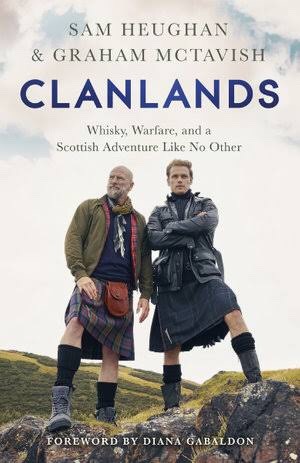
36 notes
·
View notes
Text
The Director’s Series: Gaspar Noé
The director series will consist of me concentrating on the filmography of all my favorite directors. I will rank each of their films according to my personal taste. I hope this project will provide everyone with quality recommendations and insight into films that they might not have known about.
Today’s director in spotlight is Gaspar Noé
#5 - I Stand Alone (1998)
Runtime: 1 hr 33 min
Aspect Ratio: 2.66 : 1
Film Format: 16mm
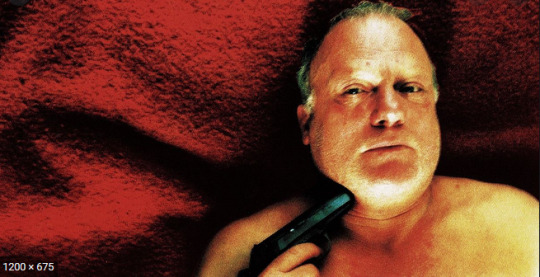
A horse meat butcher's life and mind begins to breakdown as he lashes out against various factions of society while attempting to reconnect with his estranged daughter.
Verdict: A promising debut, and an extremely shocking one at that. Noé builds upon his short film Carne, and this is a fully realized extension. I Stand Alone is a nihilistic depiction of an unhinged societal outcast. It spews just as much as hate as all of Noé’s other works, but isn’t exactly something I ever cared to return to.
#4 - Climax (2018)
Runtime: 1 hr 37 min
Aspect Ratio: 2.35 : 1
Film Format: Ari Alexa Mini Digital
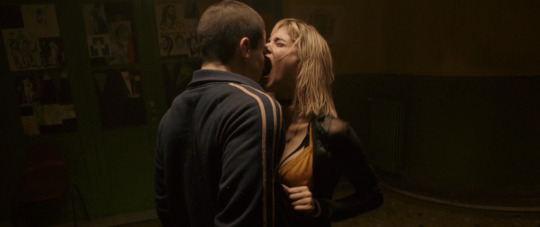
Young dancers gather in a remote and empty school building to rehearse on a cold and wintry night. The all-night celebration soon turns into a hallucinatory nightmare when they learn that their sangria is laced with LSD.
Verdict: One of Noé’s most admired works - both critically and with audiences. While I do consider it one of his lesser works, there is no denying the technical mastery instilled into every sequence. The first half of Climax is essentially a music video before the credits began to flash on-screen - that's when the truly interesting portion of this film begins. The camera work succeeded in being extremely nauseating and unsettling. All the while there is a constant barrage of wails and deep guttural crying that loops incessantly in the background. It truly does feel like a nightmare or the recesses of hell.
#3 - Love (2015)
Runtime: 2 hr 15 min
Aspect Ratio: 2.35 : 1
Film Format: Red Epic Dragon Digital
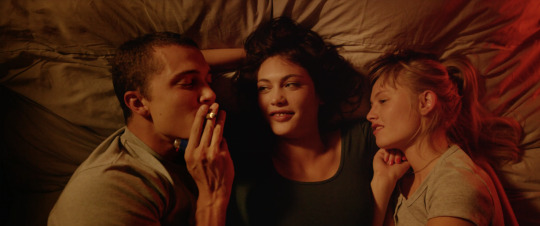
Murphy is an American living in Paris who enters a highly sexually and emotionally charged relationship with the unstable Electra. Unaware of the seismic effect it will have on their relationship, they invite their pretty neighbor into their bed.
Verdict: Love isn’t the first film to depict real life sexual intercourse instead of simulated intercourse, and it won’t be the last. Love is the type of film that a film such as Nymphomaniac wanted itself to be. Although the main character is pretty despicable, and sometimes pathetic, what else could we expect from a demented auteur such as Noé? Most of the neon splashed shots are static and don’t cut away as we watch the characters tug and toss and make love in bed. The images become hypnotizing and every frame looks like a painting come to life – oozing both color and various bodily fluids. Even though the sex scenes are extremely explicit in nature, they never really seem to be in bad taste. There is a great sense of tenderness in each of them.
#2 - Irreversible (2002)
Runtime: 1 hr 37 min
Aspect Ratio: 2.35 : 1
Film Format: 16mm & 35mm

Events over the course of one traumatic night in Paris unfold in reverse-chronological order as the beautiful Alex is brutally raped and beaten by a stranger in the underpass. Her boyfriend and ex-lover take matters into their own hands by hiring two criminals to help them find the rapist so that they can exact revenge. A simultaneously beautiful and terrible examination of the destructive nature of cause and effect, and how time destroys everything.
Verdict: One of the most impressive cinematic achievements of the 21st century - both on a technical and a storytelling level. I saw this film for the first time at sixteen years old, and I was forever desensitized to any other film that came after. Irreversible is one of the hardest films I have ever sat through in my life. I don’t even show it to friends who say they like extreme films. Benoît Debie’s camerawork is masterful and disorienting. Noé also makes some pretty genius directorial decisions with this project. Since the film is told in reverse chronological order, the ending is shown as the intro and the beginning is the last shot. This makes it a puzzle of trauma that needs to be fit together. Noé depicts sexual assault in an unforgiving manner by sitting on a static shot of the act for close to ten minutes. He wants to depict the act as it truly is - one of the utmost worst things you could do to another human being.
#1 - Enter the Void (2009)
Runtime: 2 hr 41 min
Aspect Ratio: 2.35 : 1
Film Format: 16mm & 35mm

This psychedelic tour of life after death is seen entirely from the point of view of Oscar, a young American drug dealer and addict living in Tokyo with his prostitute sister, Linda. When Oscar is killed by police during a bust gone bad, his spirit journeys from the past – where he sees his parents before their deaths – to the present – where he witnesses his own autopsy – and then to the future, where he looks out for his sister from beyond the grave.
Verdict: Enter the Void is without a doubt Noé’s finest work to date as an experimental filmmaker. It also holds the title as one of the most psychedelic films ever made, top five in my opinion no doubt. Regardless of the “trippy” label, this film is perfectly crafted in general. Very few filmmakers have dared attempt to depict a soul’s journey through death, and very few have actually been able to stick the landing. Noé took inspiration from the Tibetan Book of the Dead and crafted an experiential film all told from the main character’s POV. While not a “found footage film” in any way, instead the camera lens acts as the protagonist’s field of vision and we are with him every step of his journey. Enter the Void is a kaleidoscopic, mind-melting, disassociating journey of neon light through the abyss of Tokyo which is depicted as some sort of candy colored netherworld. Noé’s most human work he has ever made, and probably will ever make.
#gaspar noe#gaspar noé#i stand alone#climate change#irreversible#enter the void#love#benoit debie#the director's series#favorite directors#monica bellucci#vincent cassel
206 notes
·
View notes
Text
Best Movies Coming to Netflix in May 2021
https://ift.tt/3vzaZUu
Movies are slowly coming back to life at the cinemas. You can see it with each glowing report about a Godzilla vs. Kong or Mortal Kombat doing solid business. And for those with more discerning tastes, films like In the Heights and Those Who Wish Me Dead are definitely going to make their release dates.
Nonetheless, there are many who are understandably not ready to go back to theaters (or have yet to get an HBO Max subscription). Thus Netflix remains an old reliable option. While the Netflix movie selection can be narrow, each month offers some worthwhile gems to revisit or even discover. And May has a surprisingly robust group of Hollywood films from the last 40 years coming to the streaming service on May 1. Here are the best ones.
Back to the Future (1985)
Great Scott! Back to the Future is coming to Netflix. As one of the most beloved films of the 1980s—if not ever—it’s doubtful we need to explain in great detail why this is exciting news. From its star-making turn by Michael J. Fox as Marty McFly to the grand musical score by Alan Silvestri, everything about this movie justworks. Robert Zemeckis and Bob Gale’s script is like a Swiss watch in precision, paying off every single setup in the film’s first act when Marty commandeers a time machine made by Doc Brown (a lovable Christopher Lloyd) and accidentally travels from 1985 to 1955… to meet his parents as teenagers!
More time has passed since the movie’s release than the once massive generational gap between the film’s primarily ‘50s setting and 1985. Yet it still plays as a timeless story about family, time travel, and manure. Large piles of manure. By the way, the rest of the Back to the Future trilogy is coming to Netflix, too.
Hachi: A Dog’s Tale (2009)
Forget about all the “sad” dog movies of the last decade where canines have funny voiceover narrations and then die on repeat. Hachi: A Dog’s Tale is a very bitter, bittersweet dog’s journey based on a harder truth. A remake of the 1980s Japanese film, Hachikō Monogatari, this American movie is based on the real events surrounding Hachikō, an Akita dog who lived in 1920s Japan. Every day Hachikō would run to the train station, awaiting his master’s return from work. One day, after a fatal stroke, his master never returned. Yet for another 10 years, the dog would escape its various new owners and spend the afternoon waiting at the station.
Directed by The Cider House Rules’ Lasse Hallström, Hachi captures this anecdote about a dog’s loyalty with grace and genuine sweetness. But you’re not going to get through it dry-eyed.
The Land Before Time (1988)
Before it birthed a string of straight-to-video movies meant to babysit pint-sized millennials, the original Land Before Time was a generational touchstone for childhoods in the late ‘80s and early ‘90s. Overseen by Don Bluth at the height of his talent, and in partnership with Steven Spielberg’s Amblin Entertainment, The Land Before Time is a marvel in animation from the period before Disney Animation’s renaissance. It follows an assortment of baby dinosaurs, including a recently orphaned “longneck” named Littlefoot, after a horrible earthquake has rained devastation on all the isolated herbivores. But together they may just find salvation in a land called the Great Valley.
Essentially a dinosaur road movie for children, to the modern eye it’s told with a surprisingly delicate sensitivity. There is no fourth-wall breaking humor and sideways smirks here. It’s a very earnest fairytale captured in the lost art of hand-drawn animation.
The Lovely Bones (2009)
Based on Alice Sebold’s 2002 bestselling book of the same name, The Lovely Bones has a tough premise: a teen girl is raped and murdered, and goes to heaven where she watches her loved ones attempt to process and move on after her disappearance. The debut novel was not only very popular, but generally well-received for its treatment of trauma, sexual assault, and grief.
The movie, directed by Peter Jackson and starring Saoirse Ronan, Rachel Weisz, Susan Sarandon, and Stanley Tucci, among others… was not as well received, fairly criticized for its prioritization of CGI heavenly visuals over a nuanced, character-driven story. You may wonder, then, why we’re recommending a movie that wasn’t great? Because The Lovely Bones is a fascinating watch for those interested in the limits of adaptation and, in particular, how a great filmmaker with expansive resources (including a very talented cast) can fail if they’re not the right person for the job.
Mystic River (2003)
As one of Clint Eastwood’s best films as director, Mystic River was the first cinematic adaptation of a Dennis Lehane novel, and the author’s hardboiled vision of Boston’s tragically seedy underbelly is well realized here. As much about the hard luck community on the South Side as the story of three men, it nonetheless tracks how neighborhood lives intersect.
We meet three boyhood friends in the movie’s unnerving opening and then jump to their bitter middle age. Oe of them, reformed gangster Jimmy (Sean Penn), has a daughter who’s been found murdered in a gutter. His onetime pal Sean (Kevin Bacon), now a detective, swears he’ll figure out who the killer is, and both men’s estranged acquaintance Dave (Tim Robbins) knows more than he’s letting on. All three’s fates are interlinked in this operatic passion play about the traumas we keep hidden until we’re drowning in regret.
Notting Hill (1999)
Though Four Weddings and a Funeral might have put writer Richard Curtis and star Hugh Grant on the map as the kings of ‘90s British romance, Notting Hill is arguably their true pinnacle. Grant plays a foppish bookshop owner who happens to meet the most famous actress in the world, Anna Scott (played by Julia Roberts who might just have been the most famous actress in the world at that time) when she stumbles into his shop.
Read more
Movies
Time Travel and Romantic Comedies: A Perfect Love Match?
By Mark Harrison
Movies
Zombie Comedies Ranked
By David Crow
From the sympathy brownie competition, the junket where Grant’s William Thacker has to pretend to be a journalist from Horse & Hound, and Rhys Ifans in his pants, there are plenty of funny, moving moments. But it’s the two montage scenes—a walk through Notting Hill as seasons change to Bill Withers’ “Ain’t No Sunshine,” and the final montage to Elvis Costello’s “She”—that would melt the hardest of hearts. Rom-com perfection.
Scarface (1983)
Reviews were not initially kind to Scarface, director Brian de Palma’s explosive three-hour remake of the 1932 gangster classic starring Paul Muni (that in turn was based on a novel which loosely chronicled the rise of Al Capone). Written by Oliver Stone and starring Al Pacino as psychopathic Cuban refugee-turned-drug-kingpin Tony Montana, the 1983 film was excoriated by critics for its relentlessly graphic violence, excessive foul language, and over-the-top performances, especially by its leading man. But critics at the time missed the point: Scarface was a reflection of its time—the hedonistic, greed-driven, cocaine-fueled ‘80s—and was appropriately and utterly crazed as a result.
The film did mark the moment when Pacino transitioned from intense, thoughtful character actor to (mostly) histrionic circus barker, but he leaves it all on the field and his mania drives the fast-paced film to its epic, bloodsoaked, and unbelievable (in all aspects of the word) conclusion. As a metaphor for the insane decade of excess that birthed it, Scarface is riveting, breathless, occasionally shocking and often unintentionally hilarious. It’s the gangster movie on coke.
State of Play (2009)
Kevin Macdonald’s remake of a British miniseries by the same name turned out to be a strong thriller in its own right. With a whip smart script by Tony Gilroy and Billy Ray, this movie doubles as both an enjoyable investigative procedural and a love letter to journalism just as newspapers were beginning to die out in the 2000s. Russell Crowe plays Cal McAffrey in the film, the last of the old school guard of reporters, but his ethics will be challenged when the congressman with a dead young woman on his staff turns out to be his old college buddy (Ben Affleck). Rachel McAdams also stars as a young blogger who learns the thrill of chasing a story that takes more than an afternoon to research. Helen Mirren, Robin Wright, and Jeff Daniels also star.
The Whole Nine Yards (2000)
Remember when they made comedies for adults? The Whole Nine Yards is one such anomaly. Really a buddy film about a suicidal dentist (Matthew Perry) and a gangster living under a phony alias who moves in next door (Bruce Willis in one of his last truly charming performances), this giggles and gangsters laugher is a secretly delightful ensemble movie with a deep bench of talent. Indeed, Kevin Pollack, Amanda Peet, Nastsha Henstridge, and Michael Clarke Duncan, as the cuddliest gangster you’ll ever see punch your protagonist in the balls until he’s pissing blood, all get to shine. With a twisty plot, it’s an R-rated throwback to the type of screwball shenanigans that were once Hollywood’s bread and butter.
Zombieland (2009)
It’s rare when calling something the second best zombie comedy ever made is high praise, but in a horror subgenre that also includes Shaun of the Dead, this is high praise for Zombieland. As an R-rated teen comedy, one suspects the filmmakers almost lucked into the absurdly talented cast they assembled with Emma Stone, Jessie Eisenberg, and Woody Harrelson. In the years since this movie’s release, all three were nominated for Oscars (Stone even won one), but in ’09 they’re just having a blast with this goofy stoner hybrid about a dysfunctional makeshift family having fun during the zombie apocalypse.
Also, it features arguably the greatest comedy cameo ever conceived. If you haven’t seen it, I’m not going to spoil it for you here either…
cnx.cmd.push(function() { cnx({ playerId: "106e33c0-3911-473c-b599-b1426db57530", }).render("0270c398a82f44f49c23c16122516796"); });
The post Best Movies Coming to Netflix in May 2021 appeared first on Den of Geek.
from Den of Geek https://ift.tt/3aUlMka
4 notes
·
View notes
Text
Films of the Year 2020
1) A Beautiful Day In The Neighbourhood
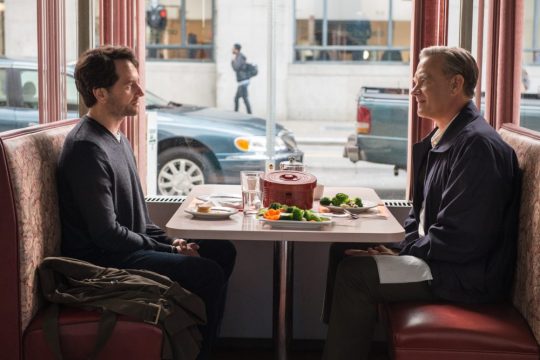
I re-watched this to make sure I wasn’t overrating it, but found myself every bit as moved, almost overwhelmed, as the first time I saw it. The confidence of Marielle Heller’s filmmaking is such that nothing ever feels forced, her themes never have to be underlined, nor does she ever have to draw attention to the quietly excellent below-the-line elements. Tom Hanks exudes warmth and compassion as Mr. Rogers, matched step for step by Matthew Rhys as the guarded, cynical journalist who resists the possibility of goodness and comfort with every fibre of his being. Some of the most masterfully filmed conversation scenes of the year - the diner sequence alone is extraordinary.
2) Parasite
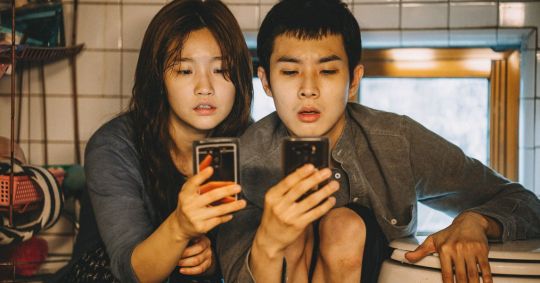
Hugely good fun, wildly unexpected, handles its tonal shifts fantastically with an ensemble cast that’s totally in tune to one another, and slickly channels the capitalist satire of Bong Joon-ho’s earlier films. It’s not that Parasite is saying anything that different or original necessarily, but it feels utterly of its moment and despite its anarchic energy is never glib or peevish. I squealed several times, laughed even more, and the film left me with a weird, immovable sense of melancholy. Deeply impressive.
3) Portrait Of A Lady On Fire
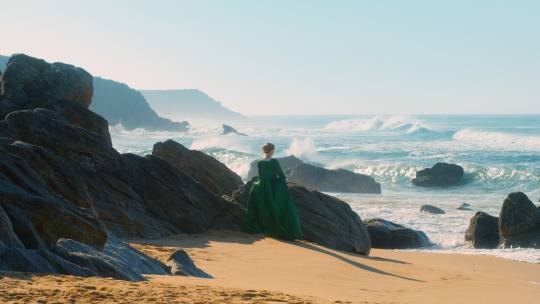
The range that Céline Sciamma has shown over just four films! Deliberately paced without ever feeling slow, I loved how invested this was in portraiture as an art form and how that folded into Marianne’s burgeoning feelings for Héloïse. Unlike a lot of other love stories, and by nature of its subject matter, Portrait is interested not just in how its two protagonists make one another feel but how they perceive one another. The ghostly apparitions that Marianne witnesses feel at first like a false note only for that to pay off beautifully in the final act. Héloïse’s final words are up there with The Lives of Others in terms of last lines that make you break out in goosebumps.
4) And Then We Danced
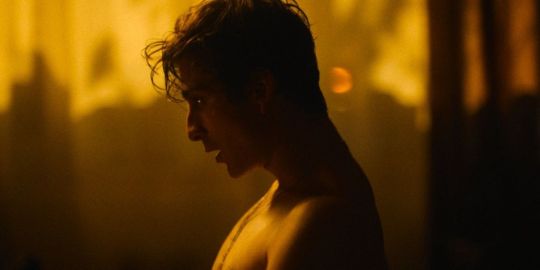
For a film that’s so concerned with the hard lines of its dance movements, it’s appropriate how tuned-in the screenplay is to when it needs to puncture its atmosphere of repressive masculinity with compassion and tenderness. Each relationship in the story is replete with texture and feeling, not just Merab’s rambunctious, chaotic home life, but also his dance partner / best friend. What really made the movie for me was how focused it was on Merab’s own journey, outside of and alongside his relationship with another male dancer.
5) A Hidden Life
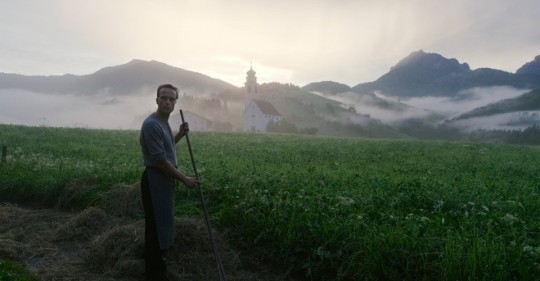
Malick is back, baby! Doesn't quite reach the giddy heights of his filmography up to and including The Tree of Life and the three-hour runtime is a little punishing, but Malick is clearly working with a renewed sense of focus and purpose. Tracking the life of Franz Jägerstätter, a conscientious objector who was executed by the Nazis in 1943, I was unexpectedly and profoundly moved by A Hidden Life’s spiritual curiosity. Franz's commitment to his faith might seem alien, but it becomes clear that it's the only thread he has to hold onto in order to see him through; even his relationship with his steadfast wife is defined by their shared religion. The roving camera and Jörg Widmer's stunning depictions of bucolic life turned sour, as the small village community become spiteful and cruel, also feel like some sort of spiritual rebuke (and it's notable that we're kept closely within Franz's POV rather than venturing out into the atrocities that lie on the margins of the film). I fully lost it when I realised that the title is taken from the monumental final paragraph of Middlemarch.
6) Never Rarely Sometimes Always
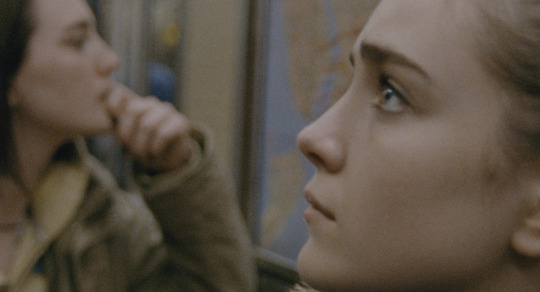
Eliza Hittman’s new film is definitely going where you think it’s going, but that hardly matters when the filmmaking and performances are this strong. Whilst it’s concerned with the difficulties of obtaining an abortion for vulnerable young women, that’s not all that’s on its mind, and I was struck by how well it draws the patriarchal society these two teenagers have to manoeuvre through every day. Hittman’s New York is a nightmare landscape, with Hélène Louvert’s cinematography expressively capturing the sense of oppressiveness and isolation that big cities can have on a person. Like with Beach Rats, Hittman draws fine performances from her leads, ones that say a lot with very little dialogue, and of course the scene that gives the film its name is just fantastic.
7) Corpus Christi

Somehow manages to overcome its reliance on coincidences in the early going to become an exhilarating, deeply-felt film about the failures of organised religion and the limits of faith. Bartosz Bielena could take me to church any day of the week, and he's truly electric as the ex-con who masquerades as the priest of a small town recently rocked by tragedy. The plot could easily be that of a Hollywood rom-com, and it's to the film's credit that, aforementioned coincidences aside, it's always interested in digging deeper. It's incredibly powerful as a testament to how difficult it is to confront the most difficult truths about ourselves and how grief is turned outwards. The visceral, upsetting fight scene that closes the film is memorable, sure, but it’s the troubled character study at its centre that ensures Corpus Christi lingers.
8) Boys State
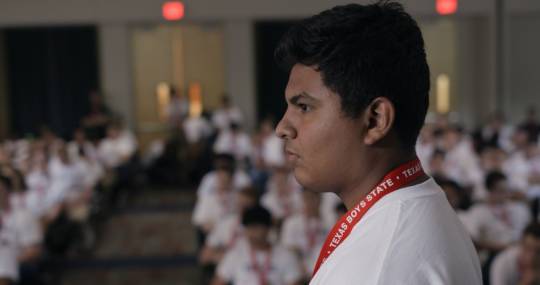
I suppose you might argue that finding a microcosm of American politics at an annual event where a group of 17-year-old boys are asked to form their own government is a little like shooting fish in a barrel, but directors Jesse Moss and Amanda McBaine mine their subject matter for much more than simple prescience. Impeccably cast and edited, it manages to be simultaneously hugely entertaining (with true heroes and villains) and also an insightful, terrifying window into the glibness with which white American men treat both real world issues and anyone on the other side of the argument. There were other, perhaps more accomplished documentaries released in 2020, but Boys State was so irresistibly of its time and so gripping because of that it kept creeping up in my estimation as the year wore on.
9) The Forty-Year-Old Version
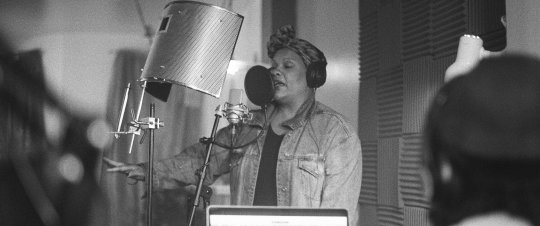
What a fun, smart screenplay this is. Which isn't to say there isn't plenty of other things that impress about this debut feature focused on an almost-forty-year-old Black woman who, frustrated with the dead end her career as a playwright seems to be facing, turns to rap as an alternative means of expression. It's incredibly astute on the ways in which Black artists are forced to compromise to appease white gatekeepers and perceived audiences, a topic that it handles with equal parts anger and wry humour. The film isn't blind, either, to the ways in which Radha's frustrations impact her relationships (particularly with her loyal agent/best friend). When the only complaint you have about a film is that it suffers from a surfeit of ideas, it’s indicative of what a special, unique voice it possesses.
10) Rocks
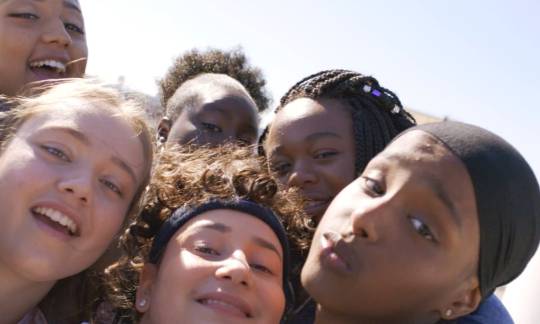
A huge step up from the stolid, dishwater-y Suffragette. The film’s deceptive simplicity in its depiction of a teenage girl and her younger brother who suddenly find themselves having to navigate an adult world they’re not ready for allows for the performances and screenplay to fill in the bustling, often joyful elements of Rocks’ life. Cast perfectly top to bottom, some of the film’s best scenes are where Rocks and her mates are just hanging out, shooting the shit with one another. And whilst there’s a heart-breaking centre to this particular story, it never feels reliant on pulling your heart strings, or leaning too heavily into the more troubling aspects of Rocks’ life.
Ten performances that I loved this year: Cosmo Jarvis in Calm With Horses, Joe Keery in Spree, Radha Blank in The Forty-Year-Old Version, Delroy Lindo in Da 5 Bloods, Bartosz Bielena in Corpus Christi, Cho Yeo-jeong in Parasite, Hugh Jackman in Bad Education, Alfre Woodard in Clemency, Johnny Flynn in Emma and Haley Bennett in Swallow.
6 notes
·
View notes
Text
The 13th Warrior
The 13th Warrior, directed by John McTiernan who brought to life Predator, Die Hard, and The Hunt for Red October. Also written by Michael Crichton who wrote such classics as Jurassic Park, West World, and many others, now brings this tale of an Arab ambassador who must join a group of Vikings on a quest to save a village from mysterious cannibalistic attackers. 12 warriors were chosen to go on this quest but the th 13th must be a man "not from the North" thus making him the 13th Warrior.
If this description sounds vague and non descriptive it is not a mistake, this movie does not give much detail leading into the thick of its story. It simply tells you that "this" is going to happen and then it does it without much detail as to why. Even though this hurts the movie initially, it is advised to accept this lack of "why is this happening" early on because there are some good moments in this movie that make it worth watching. With that being said, the action is exciting and it feels like any character could suffer or die at any moment. This is important because later you truly gain this feeling of your back is against this wall and you can only way out is to fight.
However, this movie is such a large contradiction of itself. On one hand this movie has moments where the audience feels invested in the moment and it truly brings you into this strange world with a mysteriousenemy. But that is just it, moments. Everything else around the moments brings it down to incredible mediocrity and sometimes just poor filmmaking.
Antonio Banderas as the 13th Warrior does a phenomenal job. He is truly the highlight of the acting in this movie. On the opposite side it also shows how poor the acting is everywhere else in the movie. Every character in this movie has a moment or part of a scene that they do OK in or even good in but for the majority of this movie the acting is very stagnant. This can must likely be attributed to possible lip dubbing which is noticable at times. The action however is fairly consistent. It doesn't ever feel unbelievable where the protagonist can survive anything and most of the time you can actually tell what is happening, in all of its gory glory. Parts of scenes are at night or in the dark lit only by fire but I never felt that I could not tell what was going on any longer than a second or two.
The ultimate high point that I cannot emphasize enough is the soundtrack composed by Jerry Goldsmith. This lifts the movie far above from sheer mediocrity that it could have fallen down to. When this score is placed over action, horse riding or even small to large victories it just intensifies everything.
Now is probably the most odd and inconsistent part of this movie that must be brought up; the cinematography. This movie goes all over the place with its camera work, at times it looks like a standard crane shot showing some set up to lead into the actors close up and then it goes into some guerilla style hand shot filming. Sometimes these things work and set up a very good shot and emphasize the character or sets the scene with what the characters are about walk into. Other times however the audience will ask themselves why are they focusing on the character's shoulder. It feels as if they couldn't see everything as they were filming or they didn't take the time to try different takes. Luckily most of these issues occur early on but a few persist occasionally throughout the movie.
There were reshoots later after test screenings and re-edits trying to reshape the movie into something profitable but it just feels like too many hands shaping the movie.
The 13th Warrior has a good movie in it somewhere... but it's bogged down by inconsistencies and occasional poor acting. The best parts of this movie are mid way to the end, where the 'story is set up and the action picks up and it jumps from moment to moment between mysterious invaders attacking Vikings and then planning defense and retaliation. All while Antonio Banderas' character watches, learns, and develops through the action. The score by Jerry Goldsmith lifts these moments up well above and truly helps bring the audience along. I would give The 13th Warrior a 2.8 out of 5 stars. Above average but Viking and action enthusiasts would most likely enjoy this more than the average viewer. If you don't watch the movie I still recommend looking up the score by Jerry Goldsmith.
P.S. The movie (besides the first scene) seems to be shot on location and interiors do not look like sets in a studio. This is highlighted with the guerilla style filmmaking showing some of the effort put into actually being in some good locations.

4 notes
·
View notes
Text
Liar Revealed! A Bug’s Life Essay
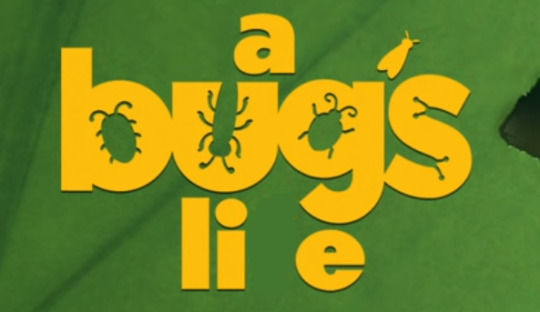
A Bug’s Life is my favourite Pixar movie and thus, it turns out I have a lot of thoughts about it. In this case, what was originally my interpretation soley in response to points I’ve seen raised on YouTube and TV Tropes has spun off into this mega essay.... all focused on a single scene.
But hey, it works with one of the film’s main messages; that something big grows out of a small idea!
The scene is the most notorious in the movie, at least from what I’ve seen, and I’m inclined to agree it’s the weakest part of this giant clock. But why is it like that and how could it have been handled better?
As I’ve said, this is actually my favourite (albeit not what I consider their very best) of Pixar’s output, and I wouldn’t have been able to go into such depth without a huge amount of love for the finished product, flawed as it may be.
It’s also possible I’ll write a more generalised thing on what I love about the film in the future, but I won’t promise anything o7;; 🐜
The Lie is ...laid
Actually, I should talk about two scenes. First is where the Lie is established:
After the humourous mutual misunderstanding between the Circus Bugs and Flik, the former are quite horrified to discover they’re expected to fight the Grasshoppers off themselves instead of putting on a show. Ahh, that old classic~
But no, they want out and Flik, who has just been informed by them during the welcoming shindig, is understandably rattled and despairing over this addition to his list of failures. He says the fallout will not only brand him, but his hypothetical grandchildren as a Terrible Loser and even says he’s as good as dead as soon as the other ants find out. Owch.
Before things get too heavy, the focus shifts around until The Bird becomes the main immediate threat. The whole Bird scene leads the ants to become convinced the Circus Bugs are really amazing warriors and, as this is the first time in what could be years that they have a crowd cheering for them it’s the success and Flik’s later idea to make a Giant Mech in the shape of a Bird instead of planning any actual combat that convinces them to play along.
So, that’s the lie set up and solidified. Now for the eventual fallout:
During a fun party after the Bird has been built, an ominous force arrives... PT Flea, the Jerkass ringmaster who had fired the Circus Bugs. This local bug promptly ruins everything by literally shining a light on the Circus Bugs and their nature as such, and then Flik is accidentally outed as the Guy Who Thought Up The Bird.
The Liar Revealed Trope
I would link the TV Tropes article here, but as tungle doesn’t like external sites I’ll just quote the more relevant parts from it:
“Liar Revealed in the Internal Reveal of The Lie, the facade maintained by a protagonist which provides the primary dramatic tension for the plot. This usually sets up the third act where the protagonists are forced to deal with the consequences of the lie on top of any external threats.
There are a few usual ways this ends up. If the lie was for selfish reasons, the protagonist will doubtless face the wrath of those he lied to, but along the way end up having a change of conscience, and try to redeem themselves through good acts and An Aesop about "what really matters". If the lie was well-intentioned, the protagonist may still find that others turn their backs on him, but go on to carry through with what they said they'd do anyway, proving themselves a hero after all.
It's worth noting that this trope is particularly easy and common to misuse, either in the tendency of the protagonist to Maintain the Lie for reasons that make no sense except for dramatic tension or of the deceived to turn against the protagonist for the deception in spite of other considerations that should by all rights absolve him.”
And in the folder there’s a specific entry for this film:
A Bug's Life has Flik supposedly finding "warrior bugs" to save his colony after misconstruing a situation. When he realizes his mistake (that they're circus performers rather than trained warriors), he's forced to keep the lie going in order to not cause panic among the other ants. Once the colony finds out, it inevitably results in one of the most painfully Played Straight examples of this trope in animation history...
As you can see there, the dislike for this scene has seeped into the entry. Of course, TV Tropes is pretty informal and I like that, but it’s telling that this is a general perception.
Continue reading below the Cut! ✂
What I don’t like
So, I think my main issue with the scene boils down to... it’s very nebulous and unclear as to what’s so bad about Flik lying. Between the Council, the Queen and Atta, there seems to be a jumbled, confusing motive traffic jam that somehow results in what TV Tropes refers to the Liar Reveal Trope being played “Painfully Straight”.
But uhh, what’s the problem? Yes, Flik lied, but we know that wasn’t something he’d planned on doing, it was his attempt at damage control. The other ants don’t know that part, but still, what are they objecting to, specifically? That the Circus bugs are Circus bugs? That the Bird Plan was Flik’s? That.... lying is treated at an absolute moral failing regardless of the circumstances??
The council dudes are like: “OH WHAAAAT, the defence plan was by Clowns??” [No, it was Flik] “OH WHAAAT, we don’t have our mafia money prepared what if Hopper finds out we nearly sicced a fake bird on him!?”
The part about objecting to Clowns drafting the defence plans is actually the more reasonable explanation, but I guess they presumed warriors habitually made Decoy Bird plans instead of fighting themselves? There’s already a hole in their objections but it only gets worse.
The Queen is like: “Wow Flik evidently you’re a self serving prick. Anyway the best thing to do is pretend this never happened and no we’re not going to tell Hopper.”
Why the fuck would that happen? ‘Oh sorry Hopper we got sidetracked doing a ...thing... so we’re still picking your food no please don’t break my legs’
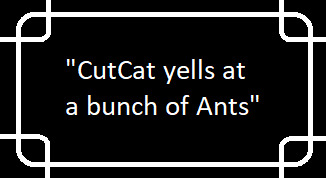
But also, why THE FUCK is this the plan? Some ruler you are, you old prune. ‘We have the bird all made and ready to go but oops the idea came from a DIRTY LIAR so we’re going to return to the doomed harvesting racket even though we’ve been set an outrageous amount and we can’t possibly hope to catch up and even if we had been picking the food the entire time it was established earlier on we won’t have time for our supplies on top of all that.’
Fucking.... astonishing lack of logic. YOU MORONS HAVE NOTHING LEFT TO LOSE, GO WITH THE BIRD! Flik himself says something to a similar effect lol
But noooooo, his arguably selfish lie [which is more Omitting the truth once he knew it, really] has forever doomed everything, apparently. Honestly it comes across more like they just hate Flik and see anything he invents as doomed to fail, so the second the truth emerges that he spearheaded the Mech Bird they dismiss it as a lost cause. Even though everyone worked together to build it, and Flik’s inventions weren’t the issue but him being awkward and clumsy. But seeing how Flik’s mere presence in his first scene seemed to drive the Council members into a quivering fury, it really does feel like their objections are from them refusing to give him a chance.
And then there’s Princess Atta. Hoo Boy.
In this scene, she comes off as being ridiculously vindictive, petty and hypocritical. This applies to the Council too, but it’s more galling coming from Atta as by now she’s realised that Flik gets a lot of flak [yay wordplay] from the others and she had resolved to give him more credit. BUT OOPS, that didn’t last!
She takes the Lying thing so personally, acting like he was cheating on her or something. “You lied to MeEeEee” well golly gee whiz, was there any particular reason why he would tell you the truth? Other than his rather obvious crush on you, that is? Cause that would still be a weird reason, seeing how the ‘lie’ was after he’d finally got a bit of decent treatment from the others, why would he wanna upset the apple cart?
He probably feared coming out and confessing to Atta [or anyone else] that they’d lose all faith in him and scrap a valid plan that was the only way out of the grasshopper racket mess. Which would be a bit silly and probably the result of someone with low self esteem and confidence issues overthinking the situation but it’s Exactly what actually happens!
It wasn’t a personal slight against you, Princess! To quote Helen Parr: THIS IS NOT! ABOUT! YOU!!
And wooow, you must be awfully chilly up there on your high horse, Miss “Lied to Flik to get rid of him earlier in the film”! Did you ever feel like fessing up? Like ‘hmm I’ve grown much fonder of this doofus, maybe I should be honest with him before engaging with some more light flirting’ ? Maybe if you had, he woulda been honest in return!
I don’t even see why she and the Council bothered lying about their Snipe Hunt ploy, seeing how now they act like he crossed a moral event horizon. Why even bother making a phoney baloney decoy idea to get him away, when they clearly dislike him enough to play the Brutally Honest card without fretting over his feelings. They coulda just ordered him to stay in a corner away from interfering but instead they’re willing to risk his life on a wild goose chase.
...And she then Banishes him! For what?? Lying? About what, the circus bugs or the bird plan? Both?? It really feels like her taking undue personal offence and the Council hating him and the Queen being old and senile.
So yeah, wow, this scene has what I think is the Unintended side effect of making me hate the stupid jerkface Ant colony as every named ant in it except for Dot fucking suck and throw Flik under a bus the second they deem him to be untrustworthy. In spite of, like, that the plan itself was solid and that the Circus Bugs have all been proven to be Good Eggs. They don’t give him a chance to explain and made their own bed to lie in, so I feel dark joy and satisfaction when the grasshoppers do arrive and kick them around some more.
Wow gee, if only you dumb ass ants had some sort of already made contraption to fall back on?
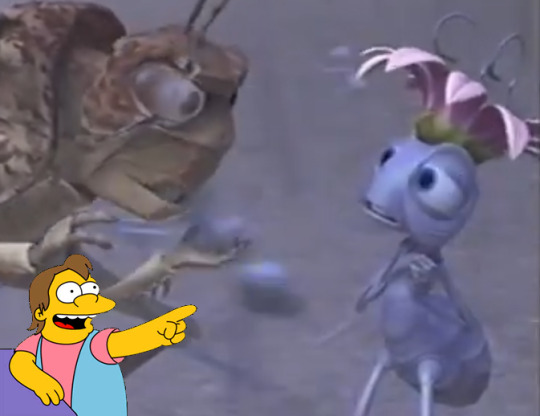
Why is it like this?
I can only make guesses here, be warned!
From what I’ve gathered of an older version of the story, mostly via Wikipedia, I kinda feel like the exposing would have fit that take better. In the beta version of the story, instead of Flik the lead would have been “Red”, who was a red ant and circus bug from the start. The first draft Circus lot woulda been out to scam the ants initially and I guess would have grown genuine fondness with time. The idea of an outsider flim flamming his way into the good books and later being exposed makes the overblown outrage a lot more understandable. But that’s my hypothesis for the direction they ultimately didn’t go in. Also look at how Red looks like a fuckboi here:
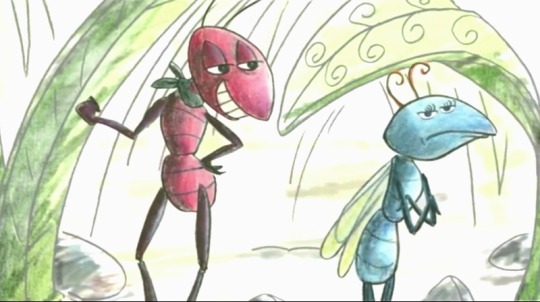
But in the final version, Red doesn’t exist! Flik is a part of the colony from the get go, but also apart from it cause no one likes him as, again, his ideas were good but poorly executed and he seemed to be a hindrance. But the ants should at least see that Flik is genuine in his attempts, that he’s trying his best and they should maybe cut him some slack.
The way the ants have their knickers in a twist doesn’t gel so well with the “Well meaning screwup” angle, especially compared to a possible “Opportunistic so-and-so who doesn’t have real attachments to the colony” route.
Also it may be worth noting up there where I put a TV Tropes excerpt, I bolded the relevant half of the run down, but it seems the other half applies much more to this first draft. Interesting...
So I don’t know, but I got the idea that the scene in the movie is basically a holdover from earlier that didn’t get sufficiently updated. The Liar Revealed Scene is the first thing I’d change if I were rewriting the script, and I might go back and change it again after other parts had been redone too, cause the story needs to flow from point A to point B etc. smoothly or else viewers will get annoyed and point it out in Youtube videos or overly long tumblr text posts.
How could it be fixed?
I’m not saying I’m sitting on the perfect idea of a rewrite. But the main thing is what I already touched on, the jarring disconnect between what happens and how the stupid ants respond.
Like, Atta’s sudden grabbing of the Jerkass and Idiot Balls in this scene. Wouldn’t it have been better if she was instead unsure and conflicted? She had lied to Flik earlier and, unlike the Council, was shown to actually realise Flik Has Feelings Too and apologised for the general lack of faith. She didn’t come clean about the Snipe Hunt Lie, so that could be weighing on her during this scene, maybe she would have been the only Council member to Not want to kick him out but felt pressured into it and hasn’t got into the groove of being the Future Queen enough to pull rank and talk them down from being hate filled twats. Maybe someone will mention the flirting that had been happening as muddying her judgement?
That’s my main idea, compare that with her barging in and taking undue personal offence and shooing him off. She’s supposed to feel like she’s doomed to fail too, so her facing a moral dilemma and falling on the wrong side of the fence could tie into that! (To be honest, her arc is kinda undercooked so hey, I’m killing two birds with one stone here!)
Flik being banished at all is a casualty of The Narrative, that he and the Circus Bugs have gotta go away temporarily for the finale to be cooler and more exciting. It’s a Necessary Weasel of writing and you’ll find them in every story ever made. Sometimes things have gotta happen cause Story Structure. The trick is having them more organic and concealed.
So yeah, have the Old Fogeys be in the wrong [which is so far unchanged] but also the majority of the ‘voting’. Make it difficult for Atta to choose between loyalty to the colony as a whole and her sense of duty versus trusting in Flik, who she now knows to always have his heart in the right place. She comes close to standing up for him and herself, but ultimately falters and gets pressured into the call made in the movie. She’s still ultimately responsible as leaders are, but in a much more sympathetic way.
Summation
This got way longer than I had initially imagined, and that’s even after I cut stuff in the editing process! Let’s quickly review the three main points I’m trying to make.
The Issue with the scene - A big song and dance is made over The Lie, but no reason why it’s such a terrible thing is offered. A perfectly sound plan is dismissed nonsensically.
Suspected reasoning for the writing - The tone matches a potential alternate story much better, where someone would have lied for self serving purposes instead of for the greater good.
A suggestion for a rewrite - Make it much more nuanced and fitting the character arcs. Give the characters a reason to react the way they do and have different responses per person. If the ants are going to drop the Bird plan, at least offer a more viable alternate route than going back to what wasn’t working before.
Does it really matter?
Well, I don’t expect a 22 year old film to suddenly get a rewrite, no. And I maintain that it’s a real gem which deserves much higher praise with the other Good Pixars instead of being so constantly overlooked.
Part of what spurred me to think about the scene and what I’d alter is seeing it referred to as ‘Kinda Bad’ in a youtube video that was talking about another Liar Reveal scene in another movie, and that is a bad take, but the point about how clunky this part is isn’t wrong. I don’t want people to dismiss the whole, beautiful image cause one section of it doesn’t vibe!
It doesn’t ruin the picture, but when people have something negative to say it’s this which is the magnet. And I’m kinda guilty of doing the same thing here, haha. But I wanted to really dissect and examine it, to figure out why it’s like that and to guess how simple it may be to rework. It’s bittersweet, but there ain’t such a thing as a perfect movie.
This has been fun for me to go into though, and it’s nice to get thoughts out from just swirling around inside my head, so even if barely anyone sees and makes it through this whole dissertation, I’m glad I wrote it out. It’s a funny way to derive enjoyment from the bumpy part of a beloved movie, but hey, I’ll take it~

11 notes
·
View notes